

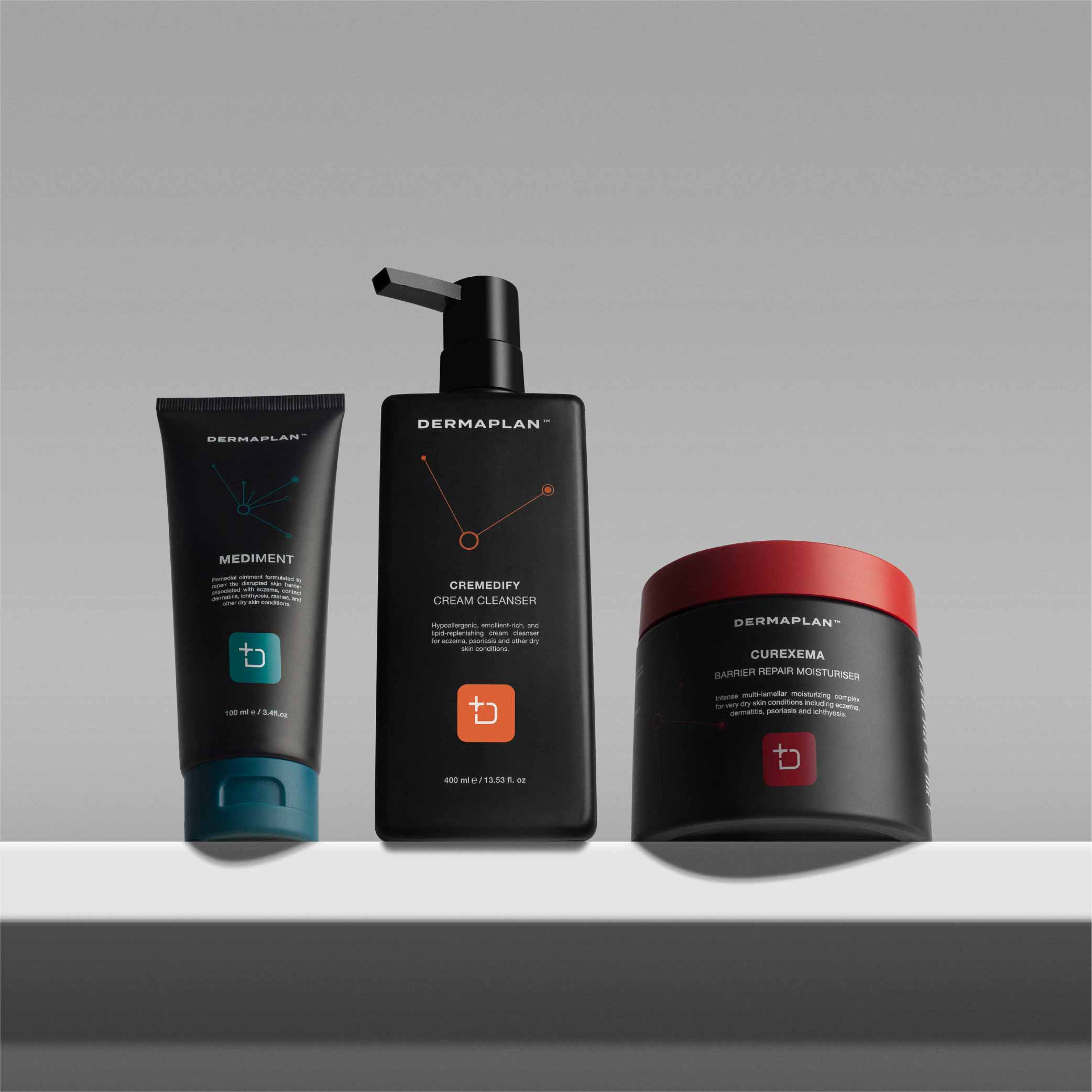
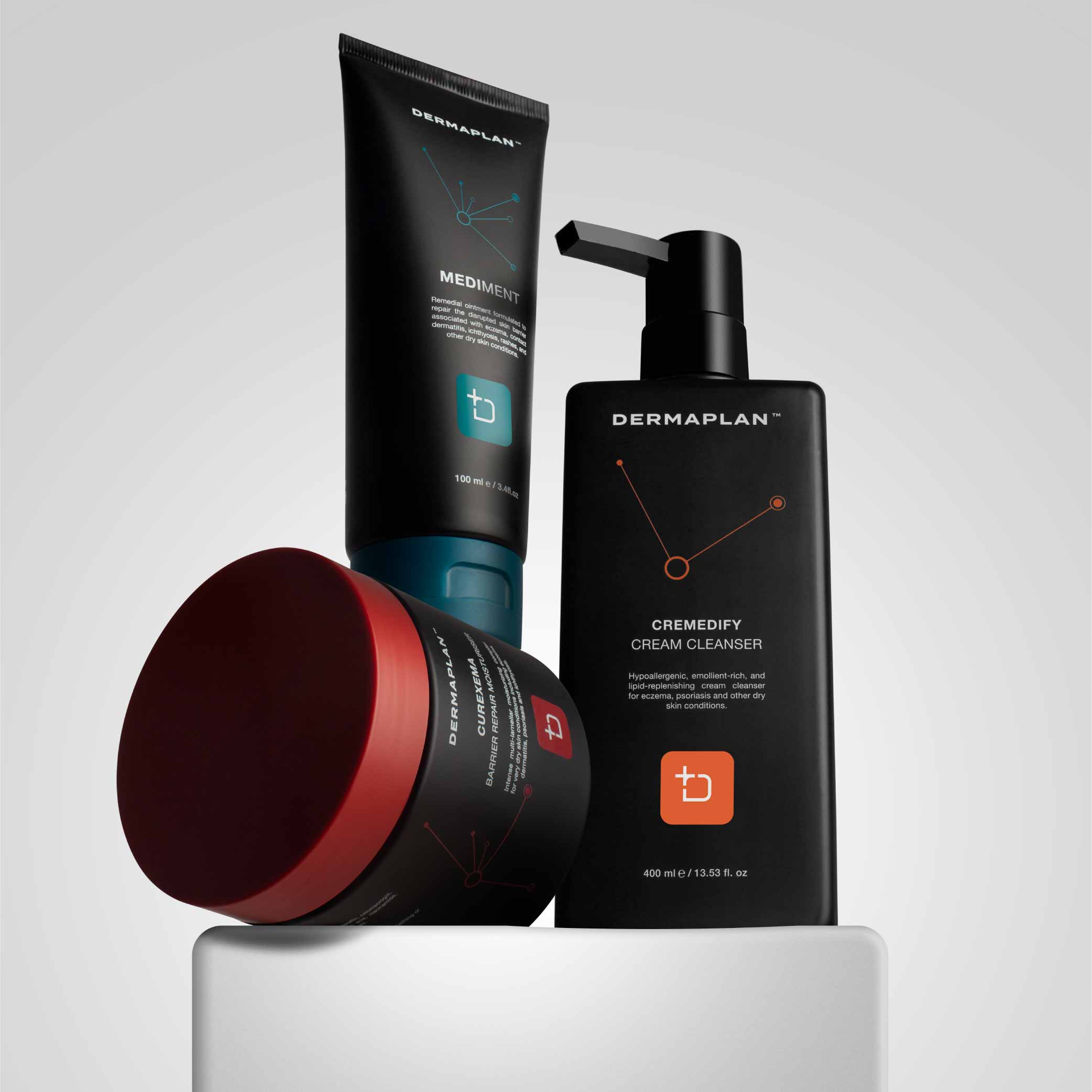
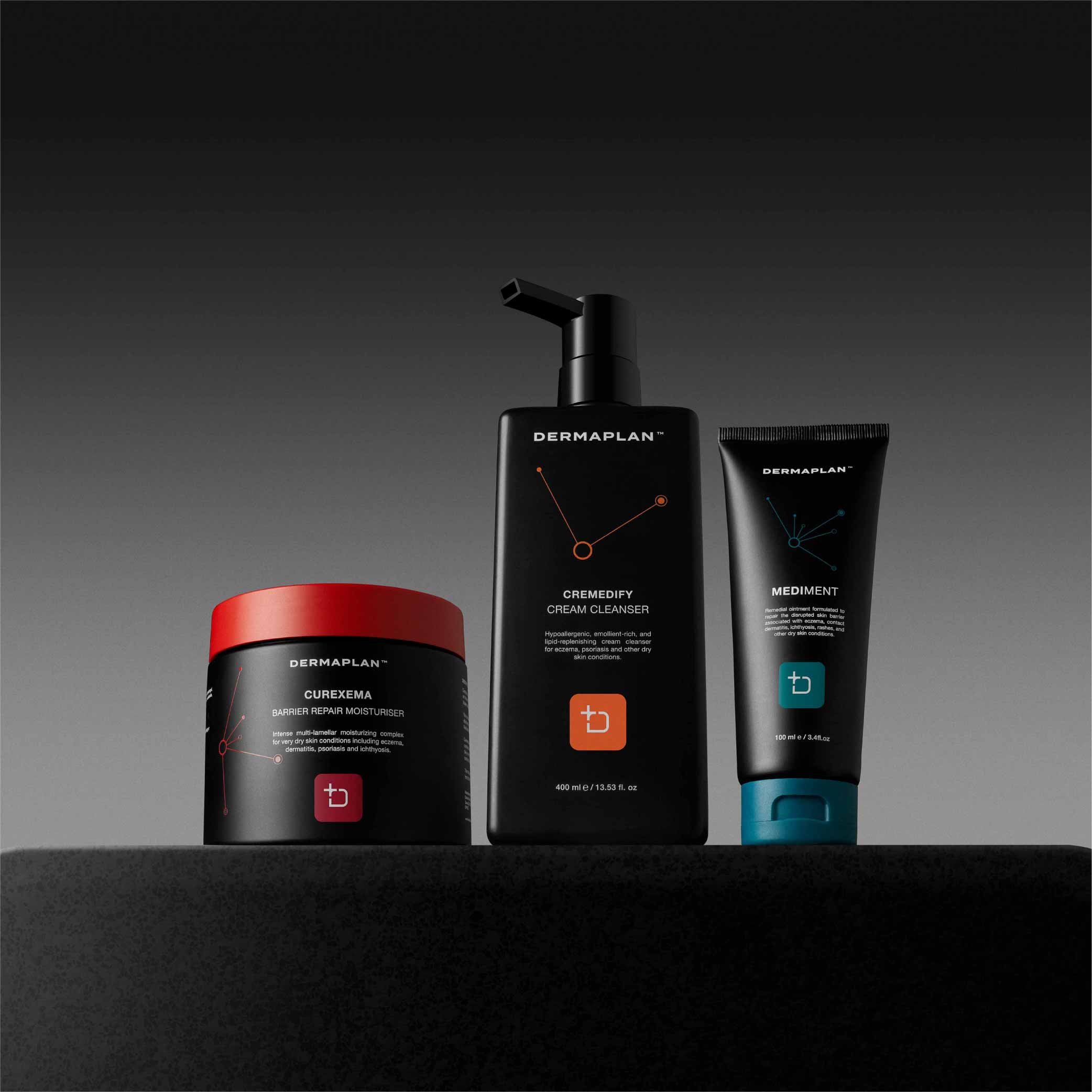




Treatment pack for Eczema & Dermatitis

irritated skin

Inflammation

Rough texture

Dry skin

Eczema
Free Gifts with Eczema Prone Treatment pack:

Travel bag

Microfibre face towel




SHIPPING
- Shipping Guarantee: Guiding you to healthy skin isn’t only about our products; it's also about getting them to you as swiftly as the science behind them. That's why Dermal Health offers a shipping guarantee you can rely on.
- Where We Ship From: Orders are dispatched from our facilities in Pretoria.
- Who We Ship With: We trust only well-known, popular, and dependable courier services with your packages.
- When You'll Get It: Expect confident skin soon! Shipping addresses in Pretoria and Johannesburg will enjoy delivery from same-day to 2 business days. Shipping addresses further from Pretoria may expect delivery within 1-4 business days, depending on the service you select during checkout. Your estimated delivery date will reflect during checkout so that you can mark your calendar.
- Tracking Your Order: Eager to start your DermExcel journey? We don't blame you! You'll receive a tracking number after you place your order so that you can follow your package.
For any shipping inquiries, our customer service team is ready to assist.
RETURNS
We are passionate about guiding you to healthier skin through medical science. We believe in the quality and proven effectiveness of our formulations — and we’re committed to supporting you on your journey to real, visible results.
That’s why we offer a 30-Day Confidence Guarantee. If, after consistent use as directed, you genuinely feel that your skin has not improved in any meaningful way — and you can demonstrate this (for example, with before-and-after photos or a brief description of your experience) — you’re welcome to request a return within 30 days of receiving your order, in line with our return policy.
Healthy skin is not complicated — and neither is our return process. To view the full terms, please visit our detailed return policy or contact our friendly customer care team. We’re here to help.
Feel as confident in us as we want you to feel in your skin.
SECURE PAYMENT
Dermal Health Science 30-Day Confidence Guarantee: We are passionate about guiding you to healthy skin through medical science. We believe in the quality and effectiveness of our products so much that we offer a 30-Day Confidence Guarantee.
If you're unsatisfied with your purchase, simply return it within 30 days for a full refund.
Healthy Skin Is Not Complicated and neither is our return policy. Please visit our detailed return policy or contact our friendly customer service team for more information.
Feel as confident in us as we want you to feel in your skin.

Choose options





Treatment pack for Eczema & Dermatitis
MORNING
EVENING
MORNING
EVENING
Morning Regimen Notes
For the best use of Cremedify Cleanser, please check the detailed instructions on its product page. You can access this page by clicking the cleanser's name above.
Massage Curexema cream into your skin using circular motions, focusing on areas of concern.
Apply a thin layer of Mediment to the severely dry or irritated areas. Use just enough to cover the affected area with a thin, protective barrier.
Evening Regimen Notes
For the best use of Cremedify Cleanser, please check the detailed instructions on its product page. You can access this page by clicking the cleanser's name above.
Massage Curexema cream into your skin using circular motions, focusing on areas of concern.
Apply a thin layer of Mediment to the severely dry or irritated areas. Use just enough to cover the affected area with a thin, protective barrier.
Important Notes
Data suggests mild bleach and water solution can decrease inflammation, itching and potentially the amount of Staphylococcus aureus bacteria on the skin, which can lead to skin infections in eczema.
- Use a half-cup of household bleach for a full tub of water, one-quarter cup for a half tub.
- Soak up to 10 minutes, then rinse off.
- Some healthcare providers suggest doing these two to three times per week.
- People with bleach sensitivities or allergic asthma that might be aggravated by chlorine fumes should consult with their healthcare provider before starting bleach bath therapy.
- Don't use excessively hot or cold water
- Don't add any other products or ingredients to the bath
- Don't soak for longer than 15 minutes
The Dermaplan Eczema Treatment Pack is an integrated skin care regimen designed specifically for individuals with eczema, psoriasis, atopic dermatitis, and those prone to dry, itching skin. This comprehensive treatment pack combines the power of three synergistic products to provide deep moisturization, strengthen the skin's natural barrier, and promote rapid healing of irritated and damaged skin.
This pack delivers a multi-faceted approach to skincare, featuring advanced technologies such as Intelligent Lipid Bilayer and Dual Lipid Bilayer. By mimicking the skin's natural protective layers, these technologies provide long-lasting hydration, regulate water loss, and strengthen and regenerate the skin's natural barrier.
The treatment pack harnesses the benefits of a rich blend of ingredients, including ceramides, essential fatty acids, cholesterol, and niacinamide, known for their ability to repair and maintain the epidermal barrier. Additional ingredients such as DuraQuench IQ SA, Medilan, and a variety of moisturizing agents like white soft paraffin, jojoba oil, and shea butter work in harmony to soothe and nourish the skin, alleviating symptoms of redness, excessive dryness, cracking, and scaling.
Suitable for the entire family, including infants and the elderly, the Dermaplan Eczema Treatment Pack is formulated with purity, tolerance, and efficacy in mind, ensuring that even the most sensitive skin can benefit from its healing properties. Whether part of a daily skincare routine or as a targeted treatment for flare-ups, this pack offers a holistic solution to managing and relieving the challenges of eczema-prone skin.
your frustrations
- Persistent Itchiness: Constant urge to scratch that can be extremely distressing and can interfere with daily activities, work, and sleep.
- Skin Discomfort: Beyond itchiness, the skin may feel sore, tight, or painfully dry, adding to the overall discomfort.
- Visible Symptoms: Red, inflamed, or flaky skin, especially on visible areas like the face, hands, and neck, can lead to self-consciousness and impact social interactions.
- Impact on Social Life: The appearance of the skin and the need to avoid certain activities or environments can lead to withdrawal from social events and activities.
- Sleep Disturbances: Itchiness and discomfort can disrupt sleep patterns, leading to fatigue and affecting overall well-being.
- Treatment Challenges: Finding effective treatments can be a process of trial and error, and the ongoing need for management can be time-consuming and sometimes disheartening.
- Lifestyle Restrictions: The need to avoid certain fabrics, products, and activities can feel limiting and frustrating.
- Emotional and Mental Health: The chronic nature of eczema and its visible symptoms can lead to anxiety, depression, and decreased self-esteem.
- Financial Burden: The cost of treatments, moisturizers, and gentle skin care products can add up, causing financial strain.
your goals
- Effective Itch Relief: Find treatments that effectively minimize or eliminate the constant itchiness, providing comfort and reducing the urge to scratch.
- Improve Skin Hydration and Health: Develop a daily skincare routine that maintains the skin's moisture barrier, reducing dryness, flakiness, and discomfort.
- Enhance Skin Appearance: Reduce visible signs of eczema such as redness, inflammation, and lesions, especially in exposed areas, improving confidence and self-esteem.
- Social and Recreational Activities: Manage eczema in a way that allows for greater participation in social events and activities without discomfort or self-consciousness.
- Improved Sleep Comfort: Alleviate night-time itchiness and discomfort, enabling restful sleep and improving overall well-being.
- Optimize Treatment Plan: Finding the most effective, personalized treatment strategy, minimizing trial and error.
- Enhance Quality of Life: Reduce the overall impact of eczema on daily living, including emotional and mental health, through effective management and support.
- Manage Costs: Affordable and sustainable options for skincare and treatment, alleviating financial stress associated with managing eczema.

↓ Barrier Function

Sensitivity

Rough Skin Texture

Aging skin
-
Compromised Skin Barrier: The skin's natural barrier is weakened by the diverse concerns of your skin, making it more susceptible to irritants, allergens, and environmental damage.
-
Sensitivity: Sensitive skin may react with stinging, burning, itching, or redness to various triggers, including certain skincare ingredients, environmental factors, and stress. This sensitivity can make finding suitable skincare products that do not exacerbate these symptoms challenging.
-
Rough and Uneven Skin Texture: When the skin struggles to retain moisture and protect against irritants, it can become dry, flaky, and take on a sandpaper-like feel—especially in areas affected by chronic inflammation.
-
Dryness: Chronic dryness challenges the skin's ability to retain moisture, leading to discomfort and enhancing the visibility of aging signs.
include
- Moisturizing Cleanser that's soap- and fragrance-free and will reinforce your skin's natural barrier while maintaining hydration levels.
- Ointments with breathable occlusive agents that create a physical barrier over the skin, locking in moisture.
- Ceramide-enriched moisturizers that will reinforce the skin barrier.
- Emollients that will fill the gaps between skin cells, helping to replace lost moisture. Apply within minutes after bathing to lock in moisture.
- Anti-inflammatory agents that will soothe and calm the skin.
- Cool, Short Baths or Showers - Limit bathing time and use lukewarm water. Gently pat your skin dry and apply moisturizer immediately afterward.
- Humidifiers in dry environments will help keep your skin hydrated.
- Cotton and Soft Fabrics - Wear loose-fitting clothes made from soft, natural fibers like cotton. Avoid rough, scratchy fibers and tight clothing.
avoid
- Irritants and Allergens may include dust, pet hair, synthetic fragrances, wool, harsh soaps, and certain food and laundry detergents. Identify and avoid allergens that may trigger flare-ups.
- Extreme Temperatures - both very hot and very cold environments can exacerbate eczema. Protect your skin in cold, windy weather.
- Long, hot showers or baths will strip your skin of its protective oils and fats.
- Stress is a well-known trigger for eczema flare-ups. Engage in stress-reducing activities and practice relaxation techniques.
- Scratching worsens symptoms and damages the skin. Keep nails short and consider wearing soft gloves at night.
- Over-exfoliation and scrubbing will damage your skin barrier.
- UV rays can not only cause harm but can also trigger eczema flare-ups.
- Tight clothing and synthetic fabrics that can irritate the skin.
Eczema / Dermatitis
Treatment Objectives

Maintain Barrier Integrity
The primary objective is to preserve the integrity of the skin's natural protective barrier to prevent future flare-ups or episodes of eczema.

Intense Moisturization
Employ high-potency moisturizers that offer deep hydration and barrier repair functionalities, due to the skin's impaired ability to retain moisture.

Avoid Triggers
Identify and avoid known triggers such as allergens, irritants, and environmental factors that can exacerbate symptoms.

Reduce Inflammation
Targeted treatments that soothe and calm the skin will mitigate the risk of flare-ups and skin aggravation, provide significant relief, and reduce skin redness.
Eczema / Dermatitis
beneficial active ingredients
Essential Fatty Acids
Essential Fatty Acids: Nourishing Your Skin from Within
In the realm of dermatological science, essential fatty acids (EFAs) have emerged as unsung heroes, offering a multifaceted approach to improving skin health in patients with conditions such as eczema and dry skin.
Pharmacological Advantages
EFAs are not only instrumental in maintaining the skin's structural integrity but also possess anti-inflammatory properties. They serve as precursors for pro-resolving lipid mediators like resolvins and protectins, which help reduce skin inflammation, itching, and redness—common symptoms of eczema.
Physiological Harmony
EFAs contribute to maintaining the balance of skin hydration. They enhance the skin's ability to retain water, leaving it supple and hydrated. Moreover, EFAs can modulate the skin's immune response, reducing the severity of allergic reactions and flare-ups often seen in dermatological conditions like eczema.
Biochemical Brilliance
Essential fatty acids, including omega-3 and omega-6, are the building blocks of the skin's lipid barrier. This barrier acts as a protective shield, preventing excessive moisture loss and shielding the skin from external aggressors. EFAs play a pivotal role in maintaining this barrier's integrity by contributing to the synthesis of ceramides and lipids that bind skin cells together.
References
- Elias, P. M. et al. (2008). Skin diseases associated with decreased epidermal lipogenesis. Annals of the New York Academy of Sciences, 1141(1), 1-13.
- Ziboh, V. A. et al. (2000). Biochemical basis of the essential fatty acid requirement for normative growth in neonatal baboons. American Journal of Clinical Nutrition, 71(1), 3-11.
- Serhan, C. N. (2014). Pro-resolving lipid mediators are leads for resolution physiology. Nature, 510(7503), 92-101.
- Levesque, A. et al. (2018). Omega-3 fatty acids: Anti-inflammatory and skin barrier benefits. Omega-3 Fatty Acids: Keys to Nutritional Health, 303-315.
- Nicolaou, A. (2013). Eicosanoids in skin inflammation. Prostaglandins, Leukotrienes, and Essential Fatty Acids, 88(1), 131-138.
- Meydani, S. N. et al. (2018). Nutrition interventions in aging and age-associated diseases. Annals of the New York Academy of Sciences, 1418(1), 34-51.
Emollients
Emollients are crucial in dermatological care, primarily because they enhance skin hydration and barrier function. Here's a brief overview of their physiological effects and roles in managing various skin conditions.
Physiological Effects
- Hydration of Stratum Corneum: Emollients increase moisture content in the stratum corneum, the outermost layer of the skin, by reducing transepidermal water loss (TEWL). This is achieved through occlusion, which traps water in the skin.
- Restoration of Skin Barrier Function: They aid in replenishing the skin's lipid barrier, which is essential for maintaining skin integrity and protective function.
- Soothing and Smoothing Effects: Emollients smooth, flaky skin cells, making the skin surface appear smoother. They also provide a soothing effect, which can reduce itching and discomfort.
- Anti-inflammatory Properties: Some emollients have ingredients that offer mild anti-inflammatory benefits, helping to reduce redness and irritation.
Managing Dermatological Conditions
- Atopic Dermatitis (Eczema): Emollients are a cornerstone in the management of eczema, helping to maintain skin hydration, reduce flare-ups, and minimize the need for topical corticosteroids.
- Psoriasis: Regular use of emollients can reduce scaling and dryness associated with psoriasis, improving the efficacy of other topical treatments.
- Ichthyosis and Xerosis: These conditions, characterized by dry, scaly skin, benefit significantly from emollients, which help hydrate and soften the skin.
- Aging Skin: Emollients improve the appearance of aging skin by hydrating and reducing the visibility of fine lines and wrinkles.
- Skin Protection: Emollients can protect the skin from irritation and breakdown in individuals with incontinence or those who are bedridden.
References
- Proksch, E., & Lachapelle, J. M. (2005). The Management of Dry Skin with Topical Emollients. American Journal of Clinical Dermatology.
- Lynde, C. W. (2001). Moisturizers: What They Are and a Practical Approach to Product Selection. Skin Therapy Letter.
- Lodén, M. (2003). Role of Topical Emollients and Moisturizers in the Treatment of Dry Skin Barrier Disorders. American Journal of Clinical Dermatology.
Lipid Bilayer Technology
Lipid bilayer technology in dermatology focuses on mimicking and reinforcing the skin's natural lipid barrier, which is vital for maintaining skin health and integrity.
Physiological Effects
- Reinforcement of Skin Barrier: Lipid bilayer technology aims to replicate the skin's natural barrier, particularly beneficial for damaged or compromised skin. This reinforcement helps in reducing transepidermal water loss (TEWL) and enhancing skin hydration.
- Restoration of Lipid Composition: It helps in replenishing the essential lipids that are often deficient in certain skin conditions, thereby restoring the skin's natural protective barrier.
- Improvement in Skin Texture and Hydration: By restoring the lipid bilayer, this technology improves skin texture and overall hydration, leading to healthier, more resilient skin.
- Reduction of Inflammation and Irritation: It can help in reducing inflammation and irritation, particularly in conditions where the skin barrier is compromised.
Managing Dermatological Conditions
- Atopic Dermatitis (Eczema): Lipid bilayer technology is particularly beneficial in managing eczema, as it helps in restoring the deficient skin barrier function, reducing dryness, and controlling flare-ups.
- Psoriasis: In psoriasis, where the skin barrier is also disrupted, this technology aids in hydrating the skin and reducing scaling.
- Aging Skin: The aging skin, which naturally loses lipids over time, benefits from lipid bilayer technology as it helps in maintaining skin hydration and elasticity.
- Dry Skin Conditions (Xerosis, Ichthyosis): Enhancing the skin’s lipid content can significantly improve symptoms of dryness and scaling in these conditions.
- Sensitive Skin: For sensitive skin types, lipid bilayer technology can provide a gentle and effective way to strengthen the skin barrier without causing irritation.
References
- Del Rosso, J. Q., & Levin, J. (2011). The Clinical Relevance of Maintaining the Functional Integrity of the Stratum Corneum in both Healthy and Disease-affected Skin. Journal of Clinical and Aesthetic Dermatology.
- Rawlings, A. V., & Harding, C. R. (2004). Moisturization and Skin Barrier Function. Dermatologic Therapy.
- Man, M. Q., Xin, S. J., Song, S. P., Cho, S. Y., Zhang, X. J., Tu, C. X., ... & Elias, P. M. (2009). Variation of Skin Surface pH, Sebum Content and Stratum Corneum Hydration with Age and Gender in a Large Chinese Population. Skin Pharmacology and Physiology.
d-Panthenol
d-Panthenol's multifaceted effects on skin hydration, barrier strengthening, and wound healing make it a valuable component in the management of various dermatological conditions, from dry skin to post-procedure care.
d-Panthenol, also known as pro-vitamin B5, is a popular dermatological ingredient due to its beneficial effects on the skin. Here's a brief overview of its physiological effects and roles in managing various skin conditions:
Physiological Effects
- Hydration: d-Panthenol is a humectant, meaning it helps to attract and retain moisture in the skin. This leads to increased skin hydration, which can improve skin softness and elasticity.
- Wound Healing and Repair: It plays a role in the synthesis of lipids and proteins, essential for skin repair. d-Panthenol has been shown to accelerate re-epithelialization in wound healing.
- Anti-Inflammatory Effect: d-Panthenol can reduce inflammation, making it beneficial in treating skin irritations and erythema.
- Skin Barrier Strengthening: By enhancing the synthesis of lipids and proteins, d-Panthenol contributes to the strengthening of the skin's barrier function, protecting against irritants and environmental damage.
- Soothing and Softening: It soothes the skin and makes it feel softer and smoother, which can be particularly beneficial for dry or rough skin textures.
Managing Dermatological Conditions
- Minor Wounds and Skin Irritations: Due to its role in skin repair and anti-inflammatory properties, d-Panthenol is used in the treatment of minor wounds, cuts, and skin irritations.
- Dermatitis and Eczema: It helps in managing conditions like dermatitis and eczema by reducing inflammation and enhancing skin barrier function.
- Dry Skin Conditions (Xerosis): Its moisturizing properties make it effective in treating dry skin, providing relief from itching and scaling.
- Post-procedure Care: d-Panthenol is often used in post-procedure care, such as after laser treatments or chemical peels, to aid in skin recovery and reduce inflammation.
References
- Proksch, E., & Nissen, H. P. (2002). Dexpanthenol enhances skin barrier repair and reduces inflammation after sodium lauryl sulphate-induced irritation. Journal of Dermatological Treatment.
- Ebner, F., Heller, A., Rippke, F., & Tausch, I. (2002). Topical use of dexpanthenol in skin disorders. American Journal of Clinical Dermatology.
- Camargo, F. B. Jr, Gaspar, L. R., & Maia Campos, P. M. B. G. (2011). Skin moisturizing effects of panthenol-based formulations. Journal of Cosmetic Science.
Medilan™
Medilan™'s unique formulation and hypoallergenic properties make it a valuable component in managing various dermatological conditions, particularly for hydrating and soothing sensitive and dry skin.
Medilan™, an ultra-refined, hypoallergenic medical-grade lanolin, has proven to be very beneficial for managing dermatological conditions. Below is a brief overview of its physiological effects and roles in managing various skin conditions.
Physiological Effects
- Emollient: Medilan™ is an excellent emollient, helping to soften and smooth the skin by retaining moisture. It creates an occlusive barrier, which reduces transepidermal water loss (TEWL).
- Moisturizing: It is highly effective in moisturizing dry and rough skin, enhancing skin hydration by trapping and sealing in moisture.
- Hypoallergenic: Medilan™ is ultra-purified to minimize the risk of allergic reactions, making it suitable for sensitive skin types.
- Wound Healing: Medilan™ aids in the healing process of minor cuts, abrasions, and burns by maintaining a moist wound environment.
- Skin Barrier Function: It enhances the skin's barrier function, protecting against environmental irritants and reducing the risk of skin infections.
- Lipid Replenishment: Medilan™ mimics the lipids found in human skin, helping to restore the lipid barrier of the skin, especially beneficial in dry and chapped skin conditions.
- Skin Penetration and Hydration: It can penetrate the skin and aid in water retention in the stratum corneum, the outermost layer of the skin, thus enhancing hydration.
- Occlusive Properties: Medilan™ helps reduce transepidermal water loss by forming a barrier on the skin surface, thereby retaining moisture and improving skin barrier function.
Managing Dermatological Conditions
- Eczema and Dry Skin Conditions: Medilan™ is a valuable ingredient in treating eczema and other dry skin conditions due to its soothing, hydrating, and occlusive properties.
- Wound Healing: While primarily used for its emollient effects, the properties of Medilan™ also aid in healing minor wounds and skin irritations.
- Sensitive Skin Care: Its hypoallergenic nature makes it suitable for sensitive skin, reducing the risk of irritation or allergic reactions.
- Nipple Care in Breastfeeding: Soothes and heals cracked and sore nipples in breastfeeding mothers.
- Chapped Lips and Skin: It effectively treats chapped lips and skin, providing a barrier that seals in moisture and protects from harsh weather conditions.
References
- Lodén, M., & Maibach, H. I. (2000). Dry skin and moisturizers: chemistry and function. CRC Press.
- Suleman, H., et al. (2000). Role of lanolin in managing eczema and dry skin conditions. Community Nurse.
- DiNardo, J. C. (2000). Is lanolin allergy a myth? Dermatitis.
- Stone, L. (2000). Medilan: a hypoallergenic lanolin for emollient therapy. British Journal of Nursing.
- ResearchGate Article on Medilan™ highlighting its role in skin care and emollient therapy.
Niacinamide
Niacinamide offers several benefits for the skin, primarily due to its anti-inflammatory and antioxidant properties. It reduces the redness and inflammation associated with acne, rosacea, and other inflammatory skin conditions. Additionally, niacinamide's ability to improve the skin's barrier function benefits all skin types, particularly those with eczema or mature skin.
Another significant benefit of niacinamide is its role in reducing hyperpigmentation. Studies have shown that it can decrease the transfer of melanin to the epidermis, helping to fade dark spots and even out skin tone.
Niacinamide also plays a role in reducing the visible signs of aging. It has been found to stimulate collagen production and improve skin elasticity, reducing fine lines and wrinkles. Its antioxidant properties further protect the skin from environmental damage, such as pollution and UV radiation, which contribute to premature aging.
The efficacy of niacinamide and its ability to address multiple skin concerns simultaneously has led to its growing popularity in both over-the-counter and prescription skincare formulations.
Physiological Effects
- Barrier Function Enhancement: Niacinamide helps strengthen the skin’s barrier function by increasing the production of ceramides, lipids that keep the skin hydrated and protect against environmental damage.
- Anti-inflammatory Properties: It has notable anti-inflammatory effects, which are beneficial in reducing redness and inflammation associated with acne, eczema, and other inflammatory skin conditions.
- Sebum Regulation: Niacinamide helps regulate sebum production, which controls excess oiliness and can benefit acne-prone skin.
- Hyperpigmentation Reduction: It reduces hyperpigmentation by inhibiting melanosome transfer from melanocytes to keratinocytes, leading to an even skin tone.
- Anti-aging Effects: Niacinamide helps reduce the appearance of fine lines and wrinkles by boosting collagen production and improving skin elasticity.
- Antioxidant Activity: It has antioxidant properties, protecting the skin from oxidative stress and environmental aggressors like UV radiation and pollution.
Managing Dermatological Conditions
- Acne and Oily Skin: Niacinamide effectively manages acne and oily skin by regulating sebum and reducing inflammation.
- Hyperpigmentation and Melasma: Its ability to reduce melanin transfer benefits it in treating hyperpigmentation and melasma.
- Aging Skin: Niacinamide targets wrinkles and loss of firmness.
- Skin Barrier Disorders: Niacinamide is beneficial in treating skin barrier disorders like atopic dermatitis and eczema by enhancing barrier function and hydration.
- Photodamage and Skin Protection: It helps mitigate the effects of photodamage and provides some degree of protection against environmental damage.
References
- Gehring, W. (2004). Nicotinic acid/niacinamide and the skin. Journal of Cosmetic Dermatology.
- Bissett, D. L., Oblong, J. E., & Berge, C. A. (2005). Niacinamide: A B vitamin that improves aging facial skin appearance. Dermatologic Surgery.
- Snaidr, V. A., Damian, D. L., & Halliday, G. M. (2019). Nicotinamide for photoprotection and skin cancer chemoprevention: A review of efficacy and safety. Experimental Dermatology.
- Navarrete-Solís, J. et al. (2011). A Double-Blind, Randomized Clinical Trial of Niacinamide 4% versus Hydroquinone 4% in the Treatment of Melasma. Dermatology Research and Practice, 2011.
Occlusives
Occlusives are a class of substances used in dermatology that work by forming a protective barrier on the surface of the skin. This barrier plays a crucial role in skin care and the management of various dermatological conditions.
Occlusives are a vital component in skincare, particularly for conditions characterized by impaired skin barrier function and excessive dryness. Their ability to lock in moisture and protect the skin from external irritants makes them invaluable in both therapeutic and preventive dermatology.
Physiological Effects
- Moisture Retention: Occlusives reduce transepidermal water loss (TEWL) by creating a physical barrier over the skin, which traps moisture and prevents its evaporation, thereby keeping the skin hydrated.
- Skin Barrier Enhancement: They help in enhancing the skin's natural barrier function, protecting against environmental irritants and harmful substances.
- Soothing Effect: By preventing water loss and protecting the skin, occlusives can have a soothing effect, particularly on dry, irritated, or compromised skin.
- Improved Skin Texture: Regular use of occlusive agents can lead to improved skin texture, making the skin appear smoother and softer.
Managing Dermatological Conditions
- Dry Skin Conditions (Xerosis): Occlusives are essential in the management of dry skin, helping to maintain hydration and reduce scaliness and itching.
- Eczema and Atopic Dermatitis: They are commonly used in the treatment of eczema and atopic dermatitis to hydrate the skin and reduce symptoms like itching and inflammation.
- Psoriasis: In psoriasis, occlusives can help in managing scaling and dryness, and are often used in combination with other topical treatments.
- Wound Healing: Occlusives can be used in wound care to maintain a moist environment, which is conducive to healing.
- Prevention of Irritant Contact Dermatitis: They protect the skin from irritants, especially in individuals with occupational exposures to harsh chemicals or frequent hand washing.
References
- Rawlings, A. V., & Harding, C. R. (2004). Moisturization and skin barrier function. Dermatologic Therapy.
- Lodén, M. (2003). Role of Topical Emollients and Moisturizers in the Treatment of Dry Skin Barrier Disorders. American Journal of Clinical Dermatology.
- Proksch, E., & Lachapelle, J. M. (2005). The Management of Dry Skin with Topical Emollients. American Journal of Clinical Dermatology.
Hyaluronic acid
Hyaluronic acid (HA) is a naturally occurring glycosaminoglycan found throughout the body's connective, epithelial, and neural tissues. Most abundantly present in the skin, eyes, and synovial fluid, HA is renowned for its exceptional capacity to retain moisture — a single gram can hold up to six liters of water.
In skincare, the primary appeal of hyaluronic acid lies in its unparalleled hydrating abilities. As a humectant, HA attracts and retains moisture from the environment, providing intense hydration to the skin. This hydrating property contributes significantly to maintaining skin plumpness, suppleness, and elasticity.
Beyond hydration, hyaluronic acid also plays a vital role in skin repair and regeneration. It supports the skin's healing and repair processes, and its anti-inflammatory properties help calm irritated skin. Moreover, HA's ability to promote collagen production, a crucial protein for skin elasticity, further underscores its anti-aging benefits.
The molecular size of hyaluronic acid influences its skin penetration and efficacy. High-molecular-weight HA remains on the skin's surface, providing hydration and forming a barrier against moisture loss. In contrast, low-molecular-weight HA penetrates deeper into the skin's layers, offering more profound hydrating and rejuvenating effects.
Hyaluronic acid's remarkable ability to hydrate, improve skin elasticity, aid in wound healing, and provide antioxidant protection makes it valuable in managing various dermatological conditions, particularly aging, dryness, and sensitive skin.
Physiological Effects
- Hydration: Hyaluronic acid is a powerful humectant that can hold up to 1000 times its weight in water, significantly enhancing skin hydration and leading to plumper, more hydrated skin.
- Skin Elasticity and Wrinkle Reduction: By increasing skin moisture, it improves skin elasticity, reduces the appearance of fine lines and wrinkles, and gives the skin a more youthful appearance.
- Wound Healing: It plays a role in wound healing due to its ability to regulate inflammation levels and signal the body to build more blood vessels in the damaged area.
- Barrier Enhancement: Hyaluronic acid helps reinforce the skin's natural barriers, protecting against environmental factors and retaining moisture.
- Antioxidant Properties: It provides antioxidant defense against free-radical damage from the sun and pollution.
Managing Dermatological Conditions
- Aging Skin: Its ability to reduce wrinkles and improve skin elasticity makes it popular in anti-aging skincare products.
- Dry Skin: Hyaluronic acid is beneficial in treating dry skin conditions by providing intense hydration.
- Wound Care: Its role in wound healing is leveraged in post-procedure care, such as after laser treatments, and in healing minor cuts and abrasions.
- Acne Scars: It can help treat acne scars by promoting skin regeneration and reducing inflammation.
- Sensitive Skin: Hyaluronic acid is suitable for sensitive skin due to its gentle nature. It provides hydration without irritating.
References
- Papakonstantinou, E., Roth, M., & Karakiulakis, G. (2012). Hyaluronic acid: A key molecule in skin aging. Dermato-endocrinology.
- Jegasothy, S. M., Zabolotniaia, V., & Bielfeldt, S. (2014). Efficacy of a new topical nano-hyaluronic acid in humans. The Journal of Clinical and Aesthetic Dermatology.
- Wollina, U., & Abdel-Naser, M. B. (2019). Hyaluronic acid in the treatment and prevention of skin diseases: Molecular biological, pharmaceutical and clinical aspects. Skin Pharmacology and Physiology.
Ceramides
Ceramides, a family of lipid molecules naturally present in the skin, are integral to the structure and function of the skin barrier. They are a type of lipid that, along with cholesterol and fatty acids, forms a critical part of the stratum corneum, the outermost layer of the skin. This layer is essential for maintaining skin hydration and protecting against environmental aggressors.
Ceramides, which make up about 50% of the skin's lipid composition, play a pivotal role in maintaining the skin's barrier integrity and preventing transepidermal water loss (TEWL). By doing so, they help keep the skin hydrated and supple.
The loss or reduction of ceramides in the skin barrier is associated with several dermatological conditions, including eczema and psoriasis, where the skin becomes dry, itchy, and prone to irritation and infection. Studies have shown that the application of ceramide-containing moisturizers can effectively improve skin barrier function and increase skin hydration levels.
Ceramides are particularly beneficial for aging skin, which naturally loses ceramides over time, leading to drier and more fragile skin. By replenishing the skin's ceramide content, these products can help combat the signs of aging, such as fine lines and wrinkles.
Ceramides are integral to maintaining skin health, particularly in conditions where the skin barrier is compromised. Their role in hydrating the skin, reducing sensitivity, and improving barrier function makes them an essential component in the management of various dermatological conditions, especially eczema, psoriasis, and dry or aging skin.
Physiological Effects
- Barrier Function: Ceramides are critical components of the skin's lipid barrier. They help to prevent moisture loss and protect against environmental aggressors like pollutants and irritants.
- Hydration: By maintaining the barrier integrity, ceramides keep the skin hydrated, preventing dryness and keeping the skin supple.
- Reducing Skin Sensitivity: They play a role in reducing skin sensitivity and irritation, helping to calm inflamed and reactive skin.
- Anti-aging Properties: Ceramides can improve skin elasticity and firmness, helping to reduce the appearance of fine lines and wrinkles.
- Wound Healing: There is evidence to suggest that ceramides can aid in the skin's natural wound healing process.
Managing Dermatological Conditions
- Eczema and Atopic Dermatitis: Ceramides are often used in the treatment of eczema and atopic dermatitis, where the skin barrier is compromised, leading to dryness, itching, and inflammation.
- Psoriasis: They can help in managing psoriasis by maintaining skin hydration and barrier function, reducing scaling and dryness.
- Aging Skin: Ceramide-containing products are beneficial in anti-aging regimens due to their ability to improve skin barrier function and elasticity.
- Dry Skin (Xerosis): In the treatment of dry skin, ceramides help in restoring skin hydration and barrier function.
- Sensitive Skin: Products containing ceramides are suitable for sensitive skin as they help to restore the skin's natural barrier and reduce irritation.
References
- Del Rosso, J. Q., & Levin, J. (2011). The clinical relevance of maintaining the functional integrity of the stratum corneum in both healthy and disease-affected skin. Journal of Clinical and Aesthetic Dermatology.
- Farwanah, H., Wohlrab, J., Neubert, R. H. H., & Raith, K. (2005). Ceramides and skin function. American Journal of Clinical Dermatology.
- Di Nardo, A., Wertz, P., Giannetti, A., & Seidenari, S. (1998). Ceramide and cholesterol composition of the skin of patients with atopic dermatitis. Acta Dermato-Venereologica.
Humectants
Humectants are a vital component in skincare, particularly for conditions characterized by impaired skin barrier function and excessive dryness. Their ability to attract and retain moisture in the skin makes them invaluable in both therapeutic and preventive dermatology.
Physiological Effects
- Moisture Attraction: Humectants draw moisture from the environment and the deeper layers of the skin to the outer layer (stratum corneum), enhancing skin hydration.
- Enhancing Skin Barrier Function: By improving skin hydration, humectants help to maintain and improve the skin's barrier function, protecting against irritants and reducing transepidermal water loss (TEWL).
- Skin Elasticity and Appearance: Improved hydration can enhance skin elasticity and reduce the appearance of fine lines and wrinkles, giving the skin a plumper and smoother look.
- Soothing Effect: Humectants can have a soothing effect on the skin, particularly in conditions involving dryness or irritation.
Managing Dermatological Conditions
- Dry Skin (Xerosis): Humectants are key ingredients in many moisturizers and are highly effective in managing dry skin by providing and maintaining hydration.
- Eczema and Dermatitis: Their moisturizing and soothing properties help in relieving symptoms of eczema and dermatitis, such as dryness, itching, and irritation.
- Aging Skin: Humectants are used in anti-aging skincare products due to their ability to hydrate the skin and improve its appearance.
- Psoriasis: They can aid in reducing the dryness and scaling associated with psoriasis.
- Acne-Prone Skin: Certain humectants can be beneficial in acne treatments, as they provide necessary hydration without clogging pores.
References
- Lodén, M. (2005). Role of Topical Emollients and Moisturizers in the Treatment of Dry Skin Barrier Disorders. American Journal of Clinical Dermatology.
- Rawlings, A. V., & Canestrari, D. A. (2011). Moisturizer technology versus clinical performance. Dermatologic Therapy.
- Fluhr, J. W., Darlenski, R., & Surber, C. (2008). Glycerol and the skin: holistic approach to its origin and functions. British Journal of Dermatology.
Eczema / Dermatitis
products in your treatment pack

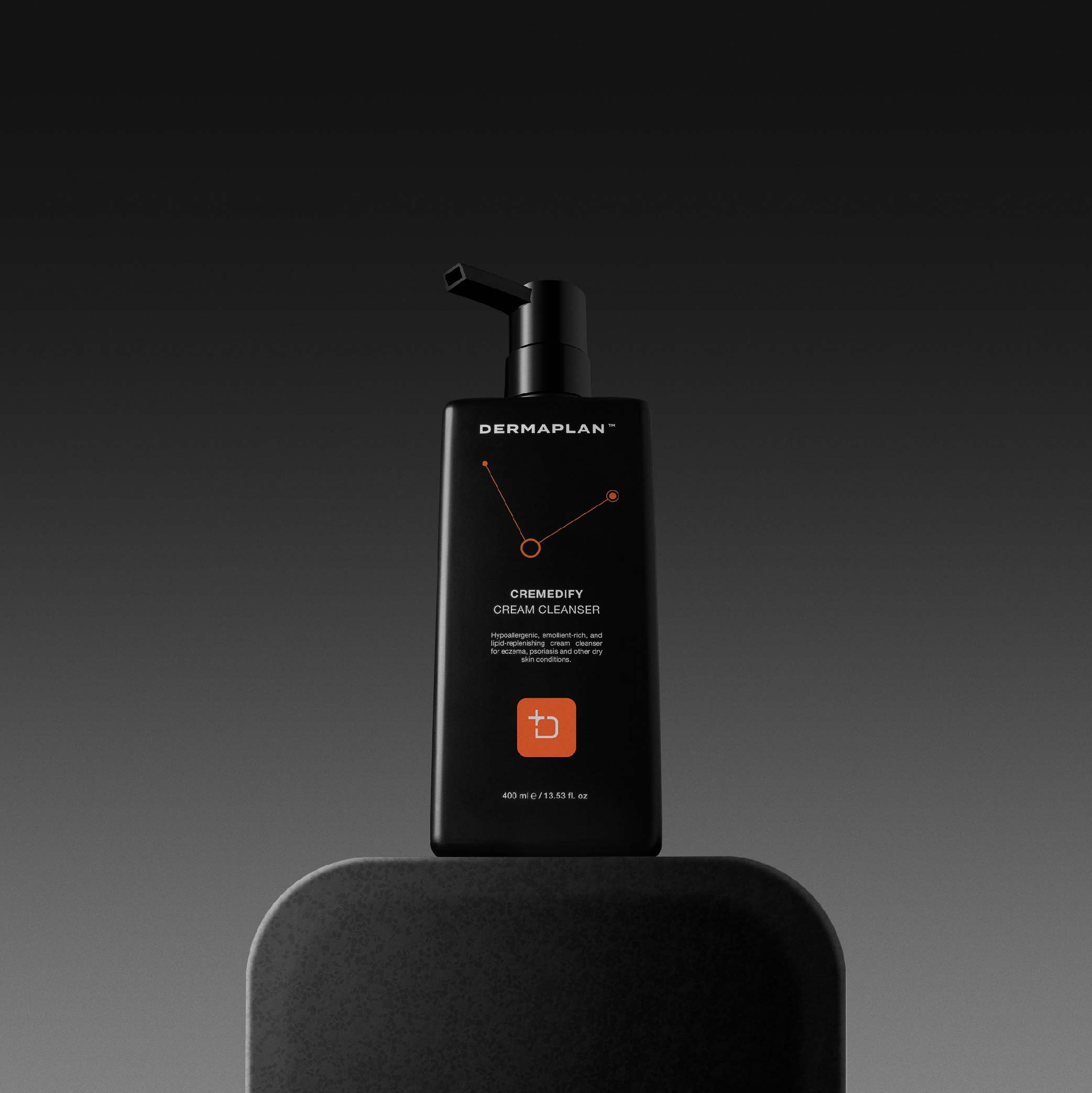
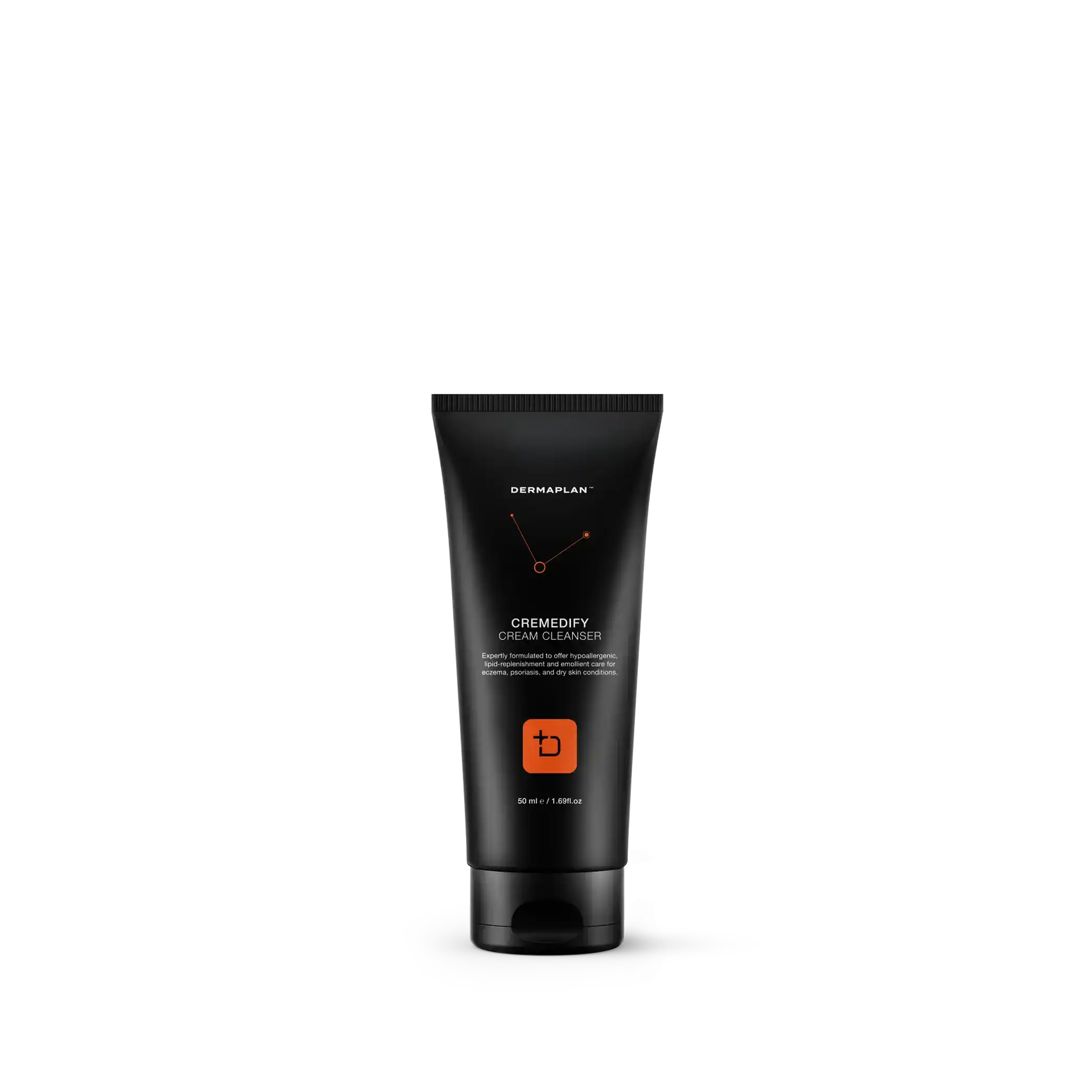





Allergies

irritated skin

Inflammation

Ichthyosis

Eczema
An Emollient-Rich and Lipid-Replenishing Body Cream Cleanser for Ichthyosis, Eczema, Psoriasis, and Other Dry Skin Conditions.
Cremedify™ is a non-foaming moisturizing cleanser formulated to effectively soothe, nourish, and calm dry, itching, psoriasis, atopic dermatitis, and eczema-prone skin.
Cremedify™ contains Intelligent Lipid Bilayer Technology that forms a double structural layer on the skin's surface to regulate water loss, strengthen and regenerate the skin's natural barrier, and ensure long-lasting hydration.
Cremedify™ includes essential fatty acids to support the epidermal barrier and effectively clean sensitive and dry skin while improving overall skin health.
More than a cleanser—Cremedify™ also doubles as a dermatologically advanced shaving cream. Its lipid-rich, emollient base delivers a softer glide that minimizes razor burn, micro-cuts, and friction. At the same time, it strengthens the barrier as you shave, leaving skin calm, smooth, and deeply hydrated. By combining cleansing, barrier repair, and shaving in one formula, Cremedify™ transforms a daily routine into a treatment step backed by science.
Take control of your skin's well-being with Cremedify™, and embrace the transformative power of our scientifically-backed, ultra-gentle moisturizing cleanser.
Emollients
Emollients are crucial in dermatological care, primarily because they enhance skin hydration and barrier function. Here's a brief overview of their physiological effects and roles in managing various skin conditions.
Physiological Effects
- Hydration of Stratum Corneum: Emollients increase moisture content in the stratum corneum, the outermost layer of the skin, by reducing transepidermal water loss (TEWL). This is achieved through occlusion, which traps water in the skin.
- Restoration of Skin Barrier Function: They aid in replenishing the skin's lipid barrier, which is essential for maintaining skin integrity and protective function.
- Soothing and Smoothing Effects: Emollients smooth, flaky skin cells, making the skin surface appear smoother. They also provide a soothing effect, which can reduce itching and discomfort.
- Anti-inflammatory Properties: Some emollients have ingredients that offer mild anti-inflammatory benefits, helping to reduce redness and irritation.
Managing Dermatological Conditions
- Atopic Dermatitis (Eczema): Emollients are a cornerstone in the management of eczema, helping to maintain skin hydration, reduce flare-ups, and minimize the need for topical corticosteroids.
- Psoriasis: Regular use of emollients can reduce scaling and dryness associated with psoriasis, improving the efficacy of other topical treatments.
- Ichthyosis and Xerosis: These conditions, characterized by dry, scaly skin, benefit significantly from emollients, which help hydrate and soften the skin.
- Aging Skin: Emollients improve the appearance of aging skin by hydrating and reducing the visibility of fine lines and wrinkles.
- Skin Protection: Emollients can protect the skin from irritation and breakdown in individuals with incontinence or those who are bedridden.
References
- Proksch, E., & Lachapelle, J. M. (2005). The Management of Dry Skin with Topical Emollients. American Journal of Clinical Dermatology.
- Lynde, C. W. (2001). Moisturizers: What They Are and a Practical Approach to Product Selection. Skin Therapy Letter.
- Lodén, M. (2003). Role of Topical Emollients and Moisturizers in the Treatment of Dry Skin Barrier Disorders. American Journal of Clinical Dermatology.
Humectants
Humectants are a vital component in skincare, particularly for conditions characterized by impaired skin barrier function and excessive dryness. Their ability to attract and retain moisture in the skin makes them invaluable in both therapeutic and preventive dermatology.
Physiological Effects
- Moisture Attraction: Humectants draw moisture from the environment and the deeper layers of the skin to the outer layer (stratum corneum), enhancing skin hydration.
- Enhancing Skin Barrier Function: By improving skin hydration, humectants help to maintain and improve the skin's barrier function, protecting against irritants and reducing transepidermal water loss (TEWL).
- Skin Elasticity and Appearance: Improved hydration can enhance skin elasticity and reduce the appearance of fine lines and wrinkles, giving the skin a plumper and smoother look.
- Soothing Effect: Humectants can have a soothing effect on the skin, particularly in conditions involving dryness or irritation.
Managing Dermatological Conditions
- Dry Skin (Xerosis): Humectants are key ingredients in many moisturizers and are highly effective in managing dry skin by providing and maintaining hydration.
- Eczema and Dermatitis: Their moisturizing and soothing properties help in relieving symptoms of eczema and dermatitis, such as dryness, itching, and irritation.
- Aging Skin: Humectants are used in anti-aging skincare products due to their ability to hydrate the skin and improve its appearance.
- Psoriasis: They can aid in reducing the dryness and scaling associated with psoriasis.
- Acne-Prone Skin: Certain humectants can be beneficial in acne treatments, as they provide necessary hydration without clogging pores.
References
- Lodén, M. (2005). Role of Topical Emollients and Moisturizers in the Treatment of Dry Skin Barrier Disorders. American Journal of Clinical Dermatology.
- Rawlings, A. V., & Canestrari, D. A. (2011). Moisturizer technology versus clinical performance. Dermatologic Therapy.
- Fluhr, J. W., Darlenski, R., & Surber, C. (2008). Glycerol and the skin: holistic approach to its origin and functions. British Journal of Dermatology.
Glycerin
Glycerin, also known as glycerol, is a simple polyol compound widely used in dermatology due to its excellent moisturizing properties.
Glycerin's excellent hydrating properties, combined with its ability to soothe and improve skin barrier function, make it a highly valued ingredient in treating and managing various dermatological conditions, particularly those involving dryness and compromised skin barrier.
Physiological Effects
- Hydration: Glycerin is a humectant that attracts water to the skin. It draws moisture from the environment and the deeper layers of the skin to the outer layer (stratum corneum), improving hydration.
- Skin Barrier Function: By enhancing skin hydration, glycerin helps to maintain and improve the skin's barrier function, protecting against irritants and reducing transepidermal water loss (TEWL).
- Soothing Effect: Its soothing effect on the skin can reduce irritation and discomfort in various skin conditions.
- Elasticity and Resilience: Glycerin can improve skin elasticity and resilience, making the skin appear healthier and more supple.
- Wound Healing: Some studies suggest that glycerin may accelerate wound healing processes and improve skin repair.
Managing Dermatological Conditions
- Dry Skin Conditions (Xerosis): Glycerin is a key ingredient in many moisturizers and is highly effective in managing dry skin by providing deep hydration.
- Eczema and Dermatitis: Its moisturizing and soothing properties help relieve the symptoms of eczema and dermatitis, such as dryness, itching, and irritation.
- Psoriasis: Glycerin can aid in reducing the dryness and scaling associated with psoriasis.
- Aging Skin: It is beneficial in anti-aging products because it hydrates the skin and improves its elasticity.
- Wound Care: Glycerin-based products may be used to treat minor wounds and burns due to their potential role in enhancing wound healing.
References
- Fluhr, J. W., Darlenski, R., & Surber, C. (2008). Glycerol and the skin: holistic approach to its origin and functions. British Journal of Dermatology.
- Harding, C. R. (2004). The stratum corneum: structure and function in health and disease. Dermatologic Therapy.
- Lodén, M. (2005). Role of topical emollients and moisturizers in the treatment of dry skin barrier disorders. American Journal of Clinical Dermatology.
Niacinamide
Niacinamide offers several benefits for the skin, primarily due to its anti-inflammatory and antioxidant properties. It reduces the redness and inflammation associated with acne, rosacea, and other inflammatory skin conditions. Additionally, niacinamide's ability to improve the skin's barrier function benefits all skin types, particularly those with eczema or mature skin.
Another significant benefit of niacinamide is its role in reducing hyperpigmentation. Studies have shown that it can decrease the transfer of melanin to the epidermis, helping to fade dark spots and even out skin tone.
Niacinamide also plays a role in reducing the visible signs of aging. It has been found to stimulate collagen production and improve skin elasticity, reducing fine lines and wrinkles. Its antioxidant properties further protect the skin from environmental damage, such as pollution and UV radiation, which contribute to premature aging.
The efficacy of niacinamide and its ability to address multiple skin concerns simultaneously has led to its growing popularity in both over-the-counter and prescription skincare formulations.
Physiological Effects
- Barrier Function Enhancement: Niacinamide helps strengthen the skin’s barrier function by increasing the production of ceramides, lipids that keep the skin hydrated and protect against environmental damage.
- Anti-inflammatory Properties: It has notable anti-inflammatory effects, which are beneficial in reducing redness and inflammation associated with acne, eczema, and other inflammatory skin conditions.
- Sebum Regulation: Niacinamide helps regulate sebum production, which controls excess oiliness and can benefit acne-prone skin.
- Hyperpigmentation Reduction: It reduces hyperpigmentation by inhibiting melanosome transfer from melanocytes to keratinocytes, leading to an even skin tone.
- Anti-aging Effects: Niacinamide helps reduce the appearance of fine lines and wrinkles by boosting collagen production and improving skin elasticity.
- Antioxidant Activity: It has antioxidant properties, protecting the skin from oxidative stress and environmental aggressors like UV radiation and pollution.
Managing Dermatological Conditions
- Acne and Oily Skin: Niacinamide effectively manages acne and oily skin by regulating sebum and reducing inflammation.
- Hyperpigmentation and Melasma: Its ability to reduce melanin transfer benefits it in treating hyperpigmentation and melasma.
- Aging Skin: Niacinamide targets wrinkles and loss of firmness.
- Skin Barrier Disorders: Niacinamide is beneficial in treating skin barrier disorders like atopic dermatitis and eczema by enhancing barrier function and hydration.
- Photodamage and Skin Protection: It helps mitigate the effects of photodamage and provides some degree of protection against environmental damage.
References
- Gehring, W. (2004). Nicotinic acid/niacinamide and the skin. Journal of Cosmetic Dermatology.
- Bissett, D. L., Oblong, J. E., & Berge, C. A. (2005). Niacinamide: A B vitamin that improves aging facial skin appearance. Dermatologic Surgery.
- Snaidr, V. A., Damian, D. L., & Halliday, G. M. (2019). Nicotinamide for photoprotection and skin cancer chemoprevention: A review of efficacy and safety. Experimental Dermatology.
- Navarrete-Solís, J. et al. (2011). A Double-Blind, Randomized Clinical Trial of Niacinamide 4% versus Hydroquinone 4% in the Treatment of Melasma. Dermatology Research and Practice, 2011.
Essential Fatty Acids
Essential Fatty Acids: Nourishing Your Skin from Within
In the realm of dermatological science, essential fatty acids (EFAs) have emerged as unsung heroes, offering a multifaceted approach to improving skin health in patients with conditions such as eczema and dry skin.
Pharmacological Advantages
EFAs are not only instrumental in maintaining the skin's structural integrity but also possess anti-inflammatory properties. They serve as precursors for pro-resolving lipid mediators like resolvins and protectins, which help reduce skin inflammation, itching, and redness—common symptoms of eczema.
Physiological Harmony
EFAs contribute to maintaining the balance of skin hydration. They enhance the skin's ability to retain water, leaving it supple and hydrated. Moreover, EFAs can modulate the skin's immune response, reducing the severity of allergic reactions and flare-ups often seen in dermatological conditions like eczema.
Biochemical Brilliance
Essential fatty acids, including omega-3 and omega-6, are the building blocks of the skin's lipid barrier. This barrier acts as a protective shield, preventing excessive moisture loss and shielding the skin from external aggressors. EFAs play a pivotal role in maintaining this barrier's integrity by contributing to the synthesis of ceramides and lipids that bind skin cells together.
References
- Elias, P. M. et al. (2008). Skin diseases associated with decreased epidermal lipogenesis. Annals of the New York Academy of Sciences, 1141(1), 1-13.
- Ziboh, V. A. et al. (2000). Biochemical basis of the essential fatty acid requirement for normative growth in neonatal baboons. American Journal of Clinical Nutrition, 71(1), 3-11.
- Serhan, C. N. (2014). Pro-resolving lipid mediators are leads for resolution physiology. Nature, 510(7503), 92-101.
- Levesque, A. et al. (2018). Omega-3 fatty acids: Anti-inflammatory and skin barrier benefits. Omega-3 Fatty Acids: Keys to Nutritional Health, 303-315.
- Nicolaou, A. (2013). Eicosanoids in skin inflammation. Prostaglandins, Leukotrienes, and Essential Fatty Acids, 88(1), 131-138.
- Meydani, S. N. et al. (2018). Nutrition interventions in aging and age-associated diseases. Annals of the New York Academy of Sciences, 1418(1), 34-51.
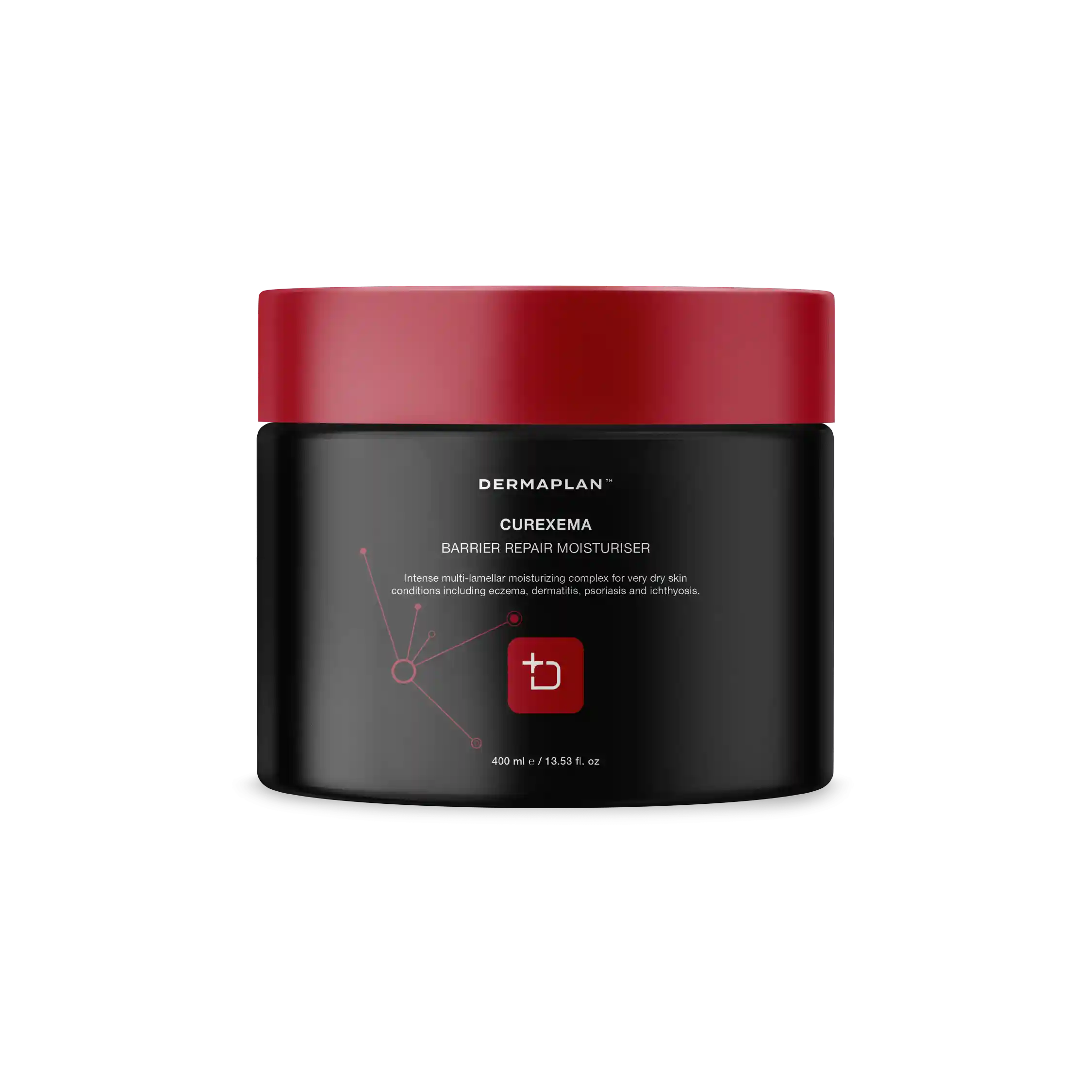
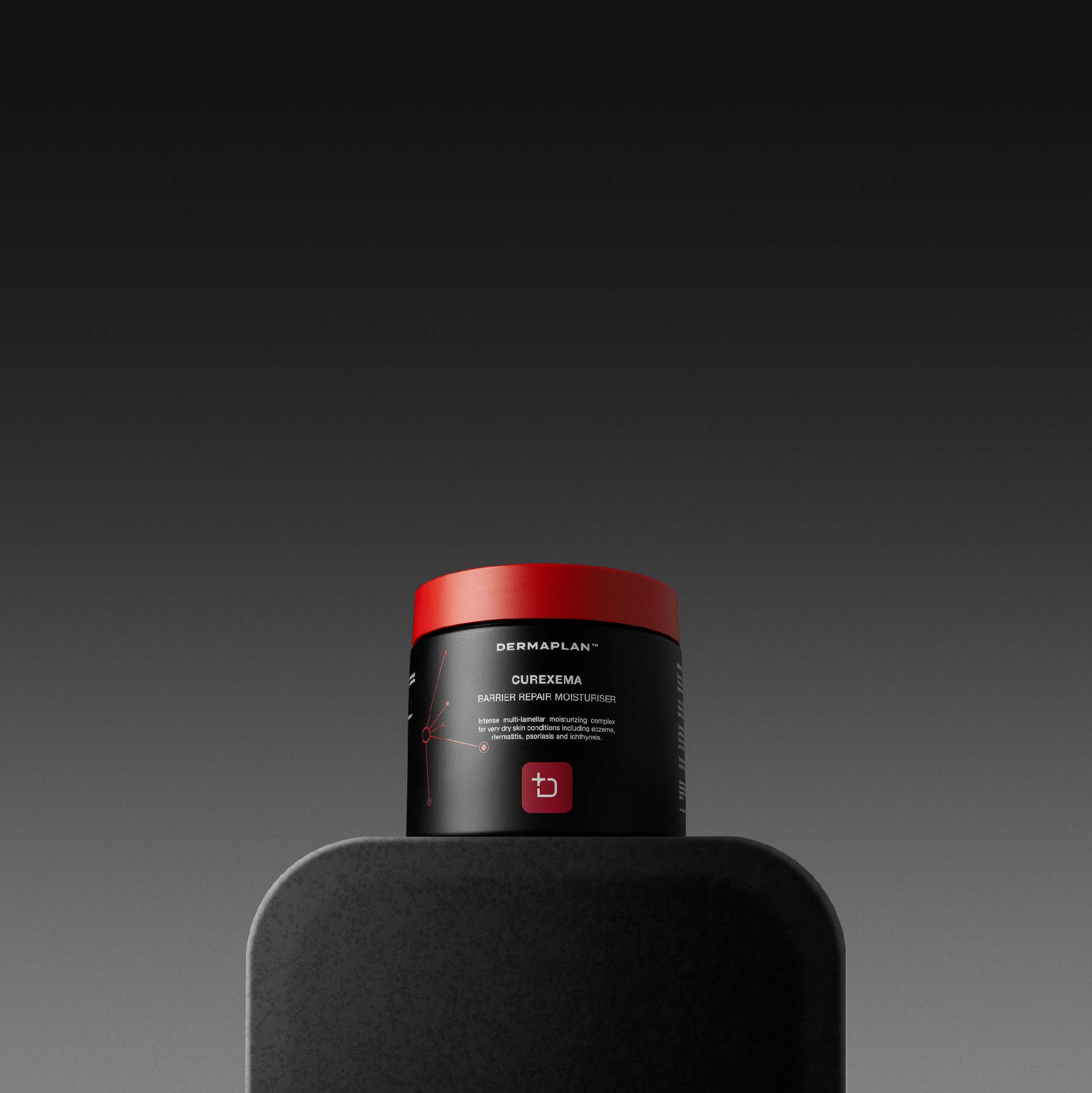
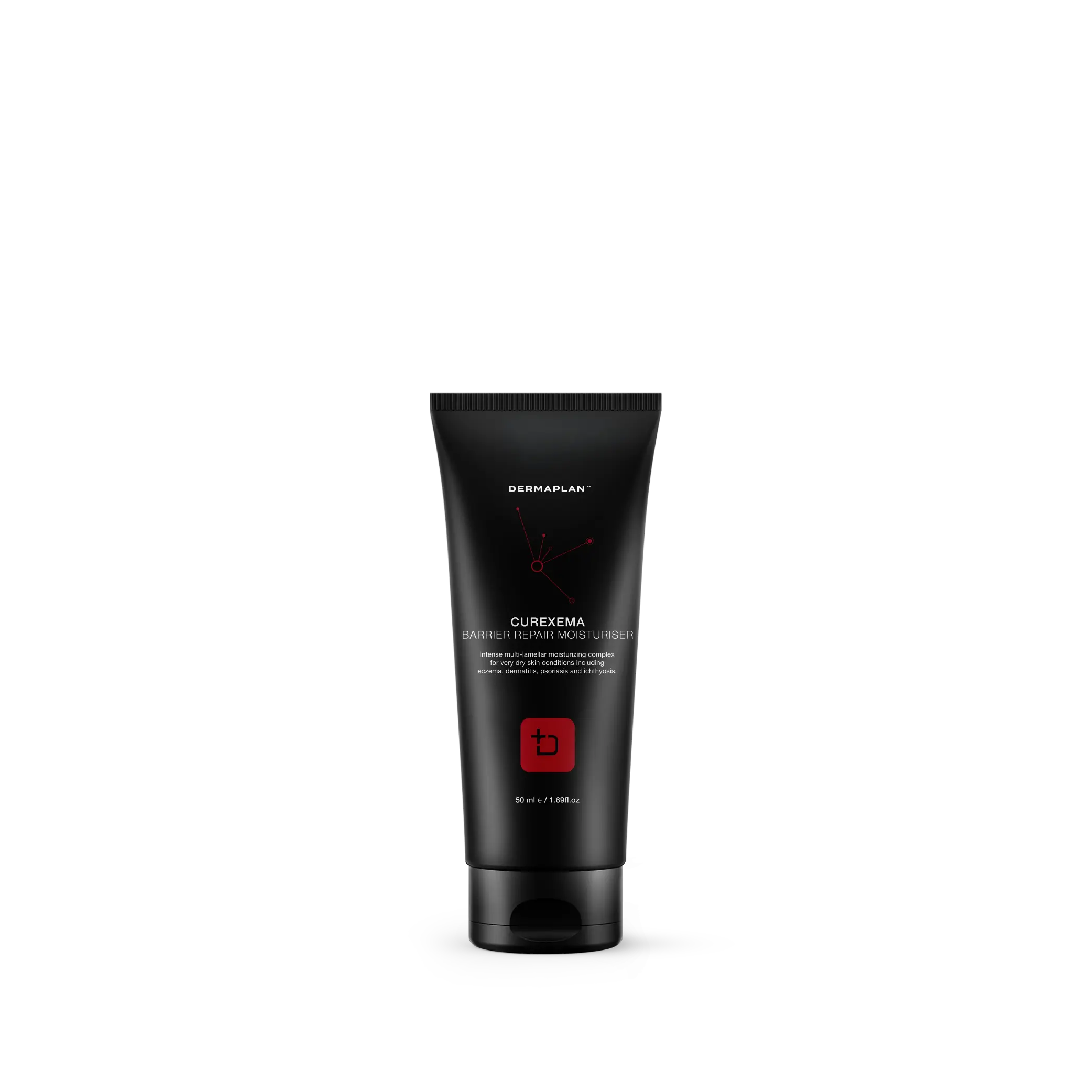





Ichthyosis

Eczema

Inflammation

Rough texture

Dry skin
Intense multi-lamellar moisturizing complex for very dry skin conditions, including eczema, dermatitis, psoriasis, and ichthyosis.
Unlock your skin's potential with Curexema, a body moisturizer specially formulated for those struggling with eczema, dry and dehydrated skin, psoriasis, and rough, scaling skin. Powered by advanced Dual Lipid Bilayer Technology, Curexema creates a double structural layer on the skin's surface, expertly regulating water loss and reinforcing the skin's natural barrier.
Immerse your skin in the optimal blend of Niacinamide, Hyaluronic Acid, d-Panthenol, and Glycerin, designed to protect the skin's barrier function, enhance texture and resilience, and reduce inflammation. With Niacinamide providing essential energy for skin cell repair, Curexema works to transform your skin from within.
Nourish your skin with the healing power of Ceramides, essential fatty acids, and Cholesterol. This potent combination rebuilds the skin's epidermal barrier, restoring structural integrity and enveloping the skin barrier in vital moisture and nourishment. Experience strengthened, soothed, and supple skin with Curexema.
Replenish your skin's essential lipids for optimal dry skin recovery, as Curexema delivers instant relief from itching, dryness, redness, roughness, and scaling.
Lipid Bilayer Technology
Lipid bilayer technology in dermatology focuses on mimicking and reinforcing the skin's natural lipid barrier, which is vital for maintaining skin health and integrity.
Physiological Effects
- Reinforcement of Skin Barrier: Lipid bilayer technology aims to replicate the skin's natural barrier, particularly beneficial for damaged or compromised skin. This reinforcement helps in reducing transepidermal water loss (TEWL) and enhancing skin hydration.
- Restoration of Lipid Composition: It helps in replenishing the essential lipids that are often deficient in certain skin conditions, thereby restoring the skin's natural protective barrier.
- Improvement in Skin Texture and Hydration: By restoring the lipid bilayer, this technology improves skin texture and overall hydration, leading to healthier, more resilient skin.
- Reduction of Inflammation and Irritation: It can help in reducing inflammation and irritation, particularly in conditions where the skin barrier is compromised.
Managing Dermatological Conditions
- Atopic Dermatitis (Eczema): Lipid bilayer technology is particularly beneficial in managing eczema, as it helps in restoring the deficient skin barrier function, reducing dryness, and controlling flare-ups.
- Psoriasis: In psoriasis, where the skin barrier is also disrupted, this technology aids in hydrating the skin and reducing scaling.
- Aging Skin: The aging skin, which naturally loses lipids over time, benefits from lipid bilayer technology as it helps in maintaining skin hydration and elasticity.
- Dry Skin Conditions (Xerosis, Ichthyosis): Enhancing the skin’s lipid content can significantly improve symptoms of dryness and scaling in these conditions.
- Sensitive Skin: For sensitive skin types, lipid bilayer technology can provide a gentle and effective way to strengthen the skin barrier without causing irritation.
References
- Del Rosso, J. Q., & Levin, J. (2011). The Clinical Relevance of Maintaining the Functional Integrity of the Stratum Corneum in both Healthy and Disease-affected Skin. Journal of Clinical and Aesthetic Dermatology.
- Rawlings, A. V., & Harding, C. R. (2004). Moisturization and Skin Barrier Function. Dermatologic Therapy.
- Man, M. Q., Xin, S. J., Song, S. P., Cho, S. Y., Zhang, X. J., Tu, C. X., ... & Elias, P. M. (2009). Variation of Skin Surface pH, Sebum Content and Stratum Corneum Hydration with Age and Gender in a Large Chinese Population. Skin Pharmacology and Physiology.
Niacinamide
Niacinamide offers several benefits for the skin, primarily due to its anti-inflammatory and antioxidant properties. It reduces the redness and inflammation associated with acne, rosacea, and other inflammatory skin conditions. Additionally, niacinamide's ability to improve the skin's barrier function benefits all skin types, particularly those with eczema or mature skin.
Another significant benefit of niacinamide is its role in reducing hyperpigmentation. Studies have shown that it can decrease the transfer of melanin to the epidermis, helping to fade dark spots and even out skin tone.
Niacinamide also plays a role in reducing the visible signs of aging. It has been found to stimulate collagen production and improve skin elasticity, reducing fine lines and wrinkles. Its antioxidant properties further protect the skin from environmental damage, such as pollution and UV radiation, which contribute to premature aging.
The efficacy of niacinamide and its ability to address multiple skin concerns simultaneously has led to its growing popularity in both over-the-counter and prescription skincare formulations.
Physiological Effects
- Barrier Function Enhancement: Niacinamide helps strengthen the skin’s barrier function by increasing the production of ceramides, lipids that keep the skin hydrated and protect against environmental damage.
- Anti-inflammatory Properties: It has notable anti-inflammatory effects, which are beneficial in reducing redness and inflammation associated with acne, eczema, and other inflammatory skin conditions.
- Sebum Regulation: Niacinamide helps regulate sebum production, which controls excess oiliness and can benefit acne-prone skin.
- Hyperpigmentation Reduction: It reduces hyperpigmentation by inhibiting melanosome transfer from melanocytes to keratinocytes, leading to an even skin tone.
- Anti-aging Effects: Niacinamide helps reduce the appearance of fine lines and wrinkles by boosting collagen production and improving skin elasticity.
- Antioxidant Activity: It has antioxidant properties, protecting the skin from oxidative stress and environmental aggressors like UV radiation and pollution.
Managing Dermatological Conditions
- Acne and Oily Skin: Niacinamide effectively manages acne and oily skin by regulating sebum and reducing inflammation.
- Hyperpigmentation and Melasma: Its ability to reduce melanin transfer benefits it in treating hyperpigmentation and melasma.
- Aging Skin: Niacinamide targets wrinkles and loss of firmness.
- Skin Barrier Disorders: Niacinamide is beneficial in treating skin barrier disorders like atopic dermatitis and eczema by enhancing barrier function and hydration.
- Photodamage and Skin Protection: It helps mitigate the effects of photodamage and provides some degree of protection against environmental damage.
References
- Gehring, W. (2004). Nicotinic acid/niacinamide and the skin. Journal of Cosmetic Dermatology.
- Bissett, D. L., Oblong, J. E., & Berge, C. A. (2005). Niacinamide: A B vitamin that improves aging facial skin appearance. Dermatologic Surgery.
- Snaidr, V. A., Damian, D. L., & Halliday, G. M. (2019). Nicotinamide for photoprotection and skin cancer chemoprevention: A review of efficacy and safety. Experimental Dermatology.
- Navarrete-Solís, J. et al. (2011). A Double-Blind, Randomized Clinical Trial of Niacinamide 4% versus Hydroquinone 4% in the Treatment of Melasma. Dermatology Research and Practice, 2011.
Ceramides
Ceramides, a family of lipid molecules naturally present in the skin, are integral to the structure and function of the skin barrier. They are a type of lipid that, along with cholesterol and fatty acids, forms a critical part of the stratum corneum, the outermost layer of the skin. This layer is essential for maintaining skin hydration and protecting against environmental aggressors.
Ceramides, which make up about 50% of the skin's lipid composition, play a pivotal role in maintaining the skin's barrier integrity and preventing transepidermal water loss (TEWL). By doing so, they help keep the skin hydrated and supple.
The loss or reduction of ceramides in the skin barrier is associated with several dermatological conditions, including eczema and psoriasis, where the skin becomes dry, itchy, and prone to irritation and infection. Studies have shown that the application of ceramide-containing moisturizers can effectively improve skin barrier function and increase skin hydration levels.
Ceramides are particularly beneficial for aging skin, which naturally loses ceramides over time, leading to drier and more fragile skin. By replenishing the skin's ceramide content, these products can help combat the signs of aging, such as fine lines and wrinkles.
Ceramides are integral to maintaining skin health, particularly in conditions where the skin barrier is compromised. Their role in hydrating the skin, reducing sensitivity, and improving barrier function makes them an essential component in the management of various dermatological conditions, especially eczema, psoriasis, and dry or aging skin.
Physiological Effects
- Barrier Function: Ceramides are critical components of the skin's lipid barrier. They help to prevent moisture loss and protect against environmental aggressors like pollutants and irritants.
- Hydration: By maintaining the barrier integrity, ceramides keep the skin hydrated, preventing dryness and keeping the skin supple.
- Reducing Skin Sensitivity: They play a role in reducing skin sensitivity and irritation, helping to calm inflamed and reactive skin.
- Anti-aging Properties: Ceramides can improve skin elasticity and firmness, helping to reduce the appearance of fine lines and wrinkles.
- Wound Healing: There is evidence to suggest that ceramides can aid in the skin's natural wound healing process.
Managing Dermatological Conditions
- Eczema and Atopic Dermatitis: Ceramides are often used in the treatment of eczema and atopic dermatitis, where the skin barrier is compromised, leading to dryness, itching, and inflammation.
- Psoriasis: They can help in managing psoriasis by maintaining skin hydration and barrier function, reducing scaling and dryness.
- Aging Skin: Ceramide-containing products are beneficial in anti-aging regimens due to their ability to improve skin barrier function and elasticity.
- Dry Skin (Xerosis): In the treatment of dry skin, ceramides help in restoring skin hydration and barrier function.
- Sensitive Skin: Products containing ceramides are suitable for sensitive skin as they help to restore the skin's natural barrier and reduce irritation.
References
- Del Rosso, J. Q., & Levin, J. (2011). The clinical relevance of maintaining the functional integrity of the stratum corneum in both healthy and disease-affected skin. Journal of Clinical and Aesthetic Dermatology.
- Farwanah, H., Wohlrab, J., Neubert, R. H. H., & Raith, K. (2005). Ceramides and skin function. American Journal of Clinical Dermatology.
- Di Nardo, A., Wertz, P., Giannetti, A., & Seidenari, S. (1998). Ceramide and cholesterol composition of the skin of patients with atopic dermatitis. Acta Dermato-Venereologica.
d-Panthenol
d-Panthenol's multifaceted effects on skin hydration, barrier strengthening, and wound healing make it a valuable component in the management of various dermatological conditions, from dry skin to post-procedure care.
d-Panthenol, also known as pro-vitamin B5, is a popular dermatological ingredient due to its beneficial effects on the skin. Here's a brief overview of its physiological effects and roles in managing various skin conditions:
Physiological Effects
- Hydration: d-Panthenol is a humectant, meaning it helps to attract and retain moisture in the skin. This leads to increased skin hydration, which can improve skin softness and elasticity.
- Wound Healing and Repair: It plays a role in the synthesis of lipids and proteins, essential for skin repair. d-Panthenol has been shown to accelerate re-epithelialization in wound healing.
- Anti-Inflammatory Effect: d-Panthenol can reduce inflammation, making it beneficial in treating skin irritations and erythema.
- Skin Barrier Strengthening: By enhancing the synthesis of lipids and proteins, d-Panthenol contributes to the strengthening of the skin's barrier function, protecting against irritants and environmental damage.
- Soothing and Softening: It soothes the skin and makes it feel softer and smoother, which can be particularly beneficial for dry or rough skin textures.
Managing Dermatological Conditions
- Minor Wounds and Skin Irritations: Due to its role in skin repair and anti-inflammatory properties, d-Panthenol is used in the treatment of minor wounds, cuts, and skin irritations.
- Dermatitis and Eczema: It helps in managing conditions like dermatitis and eczema by reducing inflammation and enhancing skin barrier function.
- Dry Skin Conditions (Xerosis): Its moisturizing properties make it effective in treating dry skin, providing relief from itching and scaling.
- Post-procedure Care: d-Panthenol is often used in post-procedure care, such as after laser treatments or chemical peels, to aid in skin recovery and reduce inflammation.
References
- Proksch, E., & Nissen, H. P. (2002). Dexpanthenol enhances skin barrier repair and reduces inflammation after sodium lauryl sulphate-induced irritation. Journal of Dermatological Treatment.
- Ebner, F., Heller, A., Rippke, F., & Tausch, I. (2002). Topical use of dexpanthenol in skin disorders. American Journal of Clinical Dermatology.
- Camargo, F. B. Jr, Gaspar, L. R., & Maia Campos, P. M. B. G. (2011). Skin moisturizing effects of panthenol-based formulations. Journal of Cosmetic Science.
Medilan™
Medilan™'s unique formulation and hypoallergenic properties make it a valuable component in managing various dermatological conditions, particularly for hydrating and soothing sensitive and dry skin.
Medilan™, an ultra-refined, hypoallergenic medical-grade lanolin, has proven to be very beneficial for managing dermatological conditions. Below is a brief overview of its physiological effects and roles in managing various skin conditions.
Physiological Effects
- Emollient: Medilan™ is an excellent emollient, helping to soften and smooth the skin by retaining moisture. It creates an occlusive barrier, which reduces transepidermal water loss (TEWL).
- Moisturizing: It is highly effective in moisturizing dry and rough skin, enhancing skin hydration by trapping and sealing in moisture.
- Hypoallergenic: Medilan™ is ultra-purified to minimize the risk of allergic reactions, making it suitable for sensitive skin types.
- Wound Healing: Medilan™ aids in the healing process of minor cuts, abrasions, and burns by maintaining a moist wound environment.
- Skin Barrier Function: It enhances the skin's barrier function, protecting against environmental irritants and reducing the risk of skin infections.
- Lipid Replenishment: Medilan™ mimics the lipids found in human skin, helping to restore the lipid barrier of the skin, especially beneficial in dry and chapped skin conditions.
- Skin Penetration and Hydration: It can penetrate the skin and aid in water retention in the stratum corneum, the outermost layer of the skin, thus enhancing hydration.
- Occlusive Properties: Medilan™ helps reduce transepidermal water loss by forming a barrier on the skin surface, thereby retaining moisture and improving skin barrier function.
Managing Dermatological Conditions
- Eczema and Dry Skin Conditions: Medilan™ is a valuable ingredient in treating eczema and other dry skin conditions due to its soothing, hydrating, and occlusive properties.
- Wound Healing: While primarily used for its emollient effects, the properties of Medilan™ also aid in healing minor wounds and skin irritations.
- Sensitive Skin Care: Its hypoallergenic nature makes it suitable for sensitive skin, reducing the risk of irritation or allergic reactions.
- Nipple Care in Breastfeeding: Soothes and heals cracked and sore nipples in breastfeeding mothers.
- Chapped Lips and Skin: It effectively treats chapped lips and skin, providing a barrier that seals in moisture and protects from harsh weather conditions.
References
- Lodén, M., & Maibach, H. I. (2000). Dry skin and moisturizers: chemistry and function. CRC Press.
- Suleman, H., et al. (2000). Role of lanolin in managing eczema and dry skin conditions. Community Nurse.
- DiNardo, J. C. (2000). Is lanolin allergy a myth? Dermatitis.
- Stone, L. (2000). Medilan: a hypoallergenic lanolin for emollient therapy. British Journal of Nursing.
- ResearchGate Article on Medilan™ highlighting its role in skin care and emollient therapy.
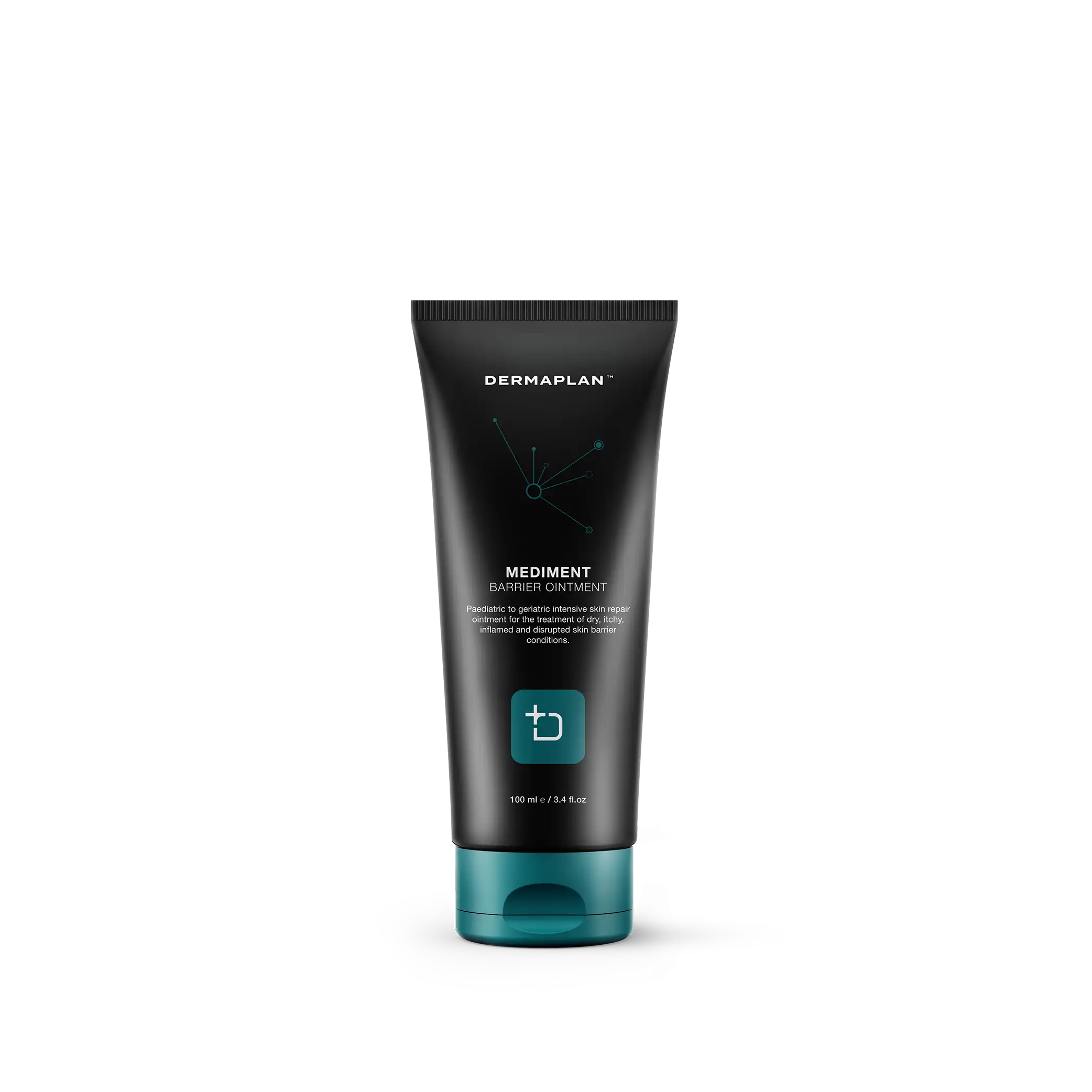
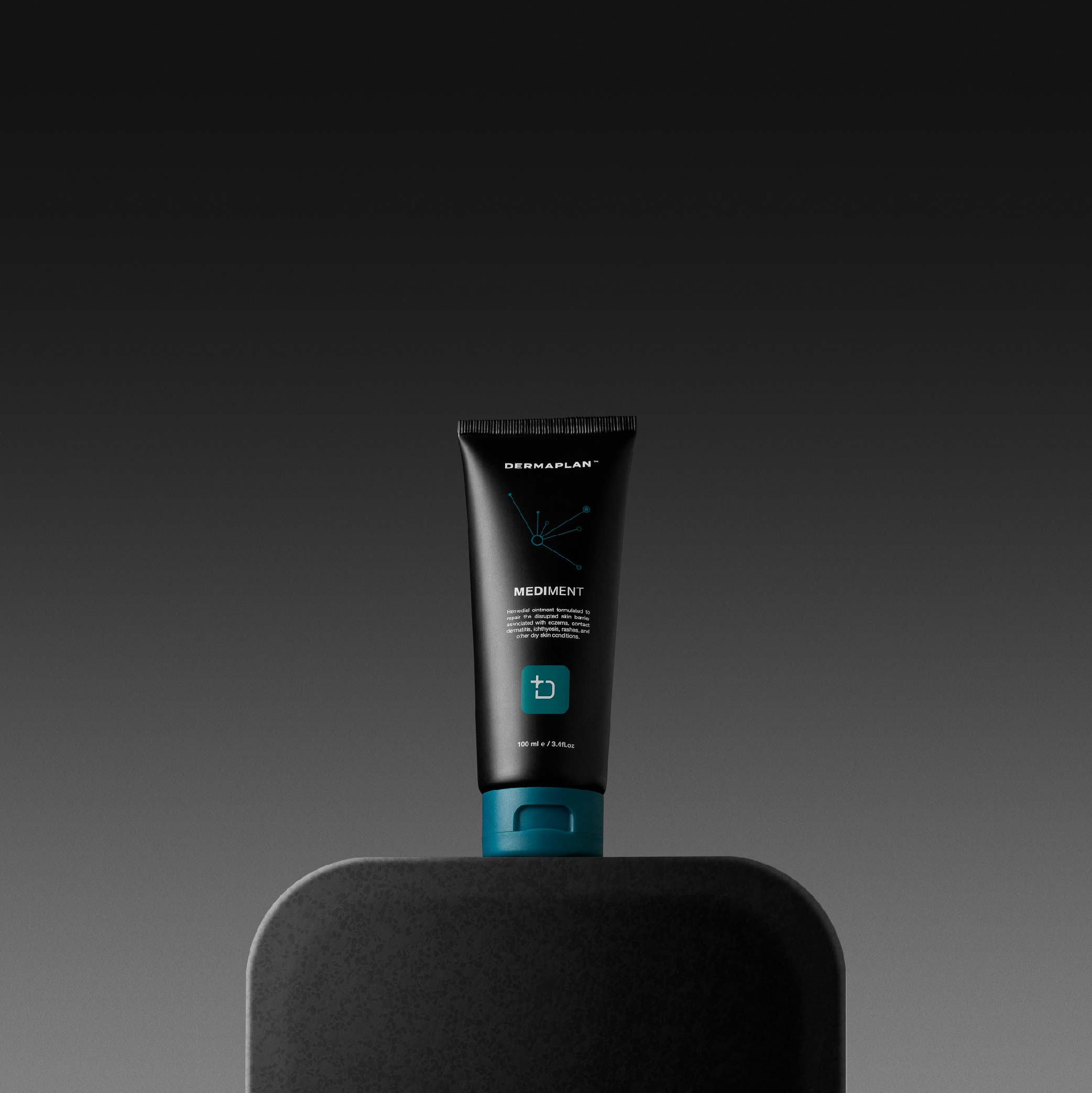
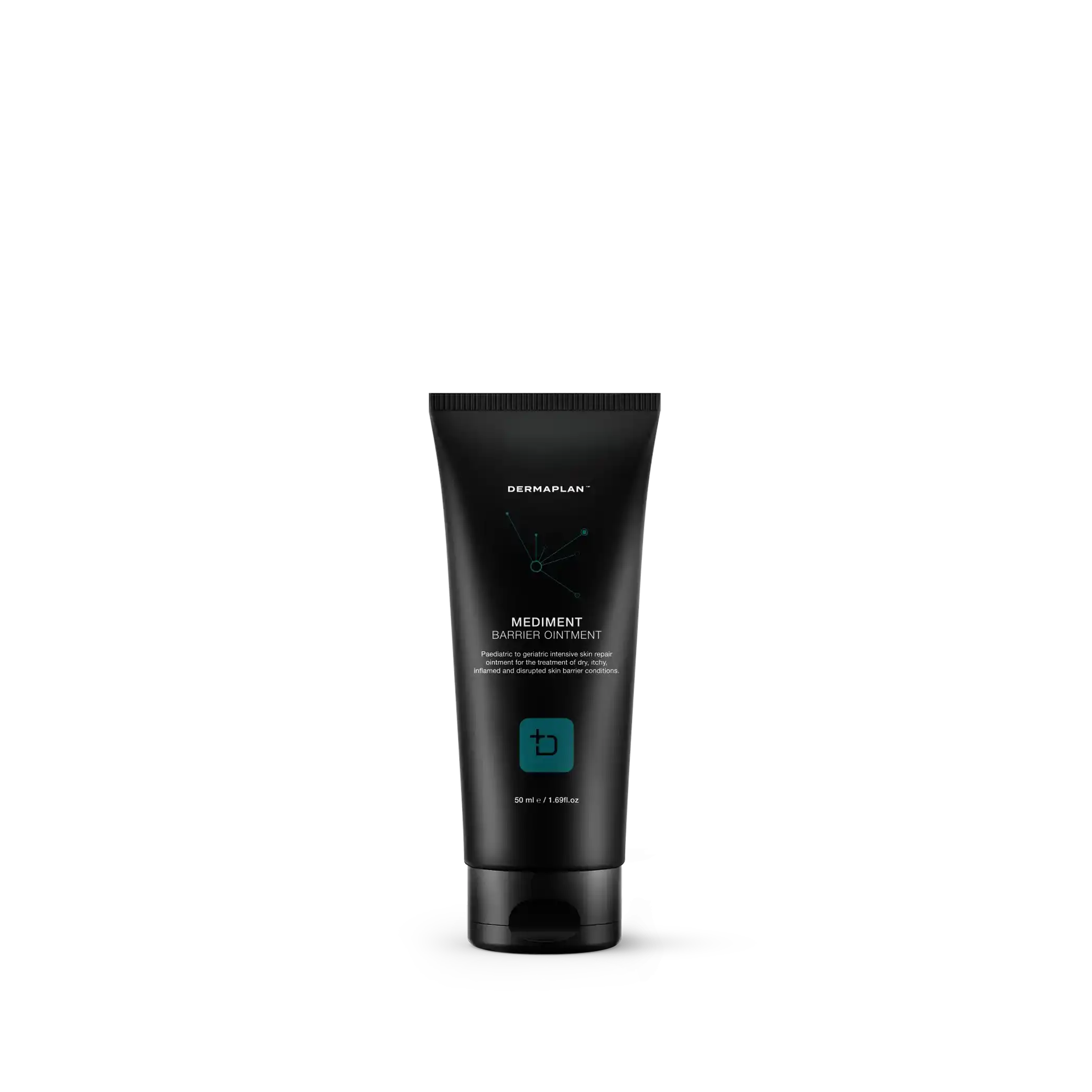





Ichthyosis

Eczema

Inflammation

Rough texture

Dry skin
A lipid-replenishing ointment expertly crafted to repair and strengthen the skin's natural protective barrier, providing instant relief and lasting nourishment for irritated and compromised skin associated with eczema, contact dermatitis, ichthyosis, rashes, and other dry skin conditions.
Mediment's transparent, water-free ointment forms a protective yet semi-occlusive shield over your skin, expertly facilitating the natural exchange of water vapor and oxygen between your skin and the environment. Its unique composition of active ingredients is carefully curated for optimal purity, tolerance, and efficacy, making it a versatile skincare solution that is safe and highly recommended for the entire family, from infants to the elderly.
Experience the profound difference Mediment can make in the health and vitality of your skin. Transform even the most stubborn dry and irritated skin conditions into a smooth, radiant, and supple canvas with the power of Mediment – the ultimate skin-healing solution for the whole family.
Essential Fatty Acids
Essential Fatty Acids: Nourishing Your Skin from Within
In the realm of dermatological science, essential fatty acids (EFAs) have emerged as unsung heroes, offering a multifaceted approach to improving skin health in patients with conditions such as eczema and dry skin.
Pharmacological Advantages
EFAs are not only instrumental in maintaining the skin's structural integrity but also possess anti-inflammatory properties. They serve as precursors for pro-resolving lipid mediators like resolvins and protectins, which help reduce skin inflammation, itching, and redness—common symptoms of eczema.
Physiological Harmony
EFAs contribute to maintaining the balance of skin hydration. They enhance the skin's ability to retain water, leaving it supple and hydrated. Moreover, EFAs can modulate the skin's immune response, reducing the severity of allergic reactions and flare-ups often seen in dermatological conditions like eczema.
Biochemical Brilliance
Essential fatty acids, including omega-3 and omega-6, are the building blocks of the skin's lipid barrier. This barrier acts as a protective shield, preventing excessive moisture loss and shielding the skin from external aggressors. EFAs play a pivotal role in maintaining this barrier's integrity by contributing to the synthesis of ceramides and lipids that bind skin cells together.
References
- Elias, P. M. et al. (2008). Skin diseases associated with decreased epidermal lipogenesis. Annals of the New York Academy of Sciences, 1141(1), 1-13.
- Ziboh, V. A. et al. (2000). Biochemical basis of the essential fatty acid requirement for normative growth in neonatal baboons. American Journal of Clinical Nutrition, 71(1), 3-11.
- Serhan, C. N. (2014). Pro-resolving lipid mediators are leads for resolution physiology. Nature, 510(7503), 92-101.
- Levesque, A. et al. (2018). Omega-3 fatty acids: Anti-inflammatory and skin barrier benefits. Omega-3 Fatty Acids: Keys to Nutritional Health, 303-315.
- Nicolaou, A. (2013). Eicosanoids in skin inflammation. Prostaglandins, Leukotrienes, and Essential Fatty Acids, 88(1), 131-138.
- Meydani, S. N. et al. (2018). Nutrition interventions in aging and age-associated diseases. Annals of the New York Academy of Sciences, 1418(1), 34-51.
Emollients
Emollients are crucial in dermatological care, primarily because they enhance skin hydration and barrier function. Here's a brief overview of their physiological effects and roles in managing various skin conditions.
Physiological Effects
- Hydration of Stratum Corneum: Emollients increase moisture content in the stratum corneum, the outermost layer of the skin, by reducing transepidermal water loss (TEWL). This is achieved through occlusion, which traps water in the skin.
- Restoration of Skin Barrier Function: They aid in replenishing the skin's lipid barrier, which is essential for maintaining skin integrity and protective function.
- Soothing and Smoothing Effects: Emollients smooth, flaky skin cells, making the skin surface appear smoother. They also provide a soothing effect, which can reduce itching and discomfort.
- Anti-inflammatory Properties: Some emollients have ingredients that offer mild anti-inflammatory benefits, helping to reduce redness and irritation.
Managing Dermatological Conditions
- Atopic Dermatitis (Eczema): Emollients are a cornerstone in the management of eczema, helping to maintain skin hydration, reduce flare-ups, and minimize the need for topical corticosteroids.
- Psoriasis: Regular use of emollients can reduce scaling and dryness associated with psoriasis, improving the efficacy of other topical treatments.
- Ichthyosis and Xerosis: These conditions, characterized by dry, scaly skin, benefit significantly from emollients, which help hydrate and soften the skin.
- Aging Skin: Emollients improve the appearance of aging skin by hydrating and reducing the visibility of fine lines and wrinkles.
- Skin Protection: Emollients can protect the skin from irritation and breakdown in individuals with incontinence or those who are bedridden.
References
- Proksch, E., & Lachapelle, J. M. (2005). The Management of Dry Skin with Topical Emollients. American Journal of Clinical Dermatology.
- Lynde, C. W. (2001). Moisturizers: What They Are and a Practical Approach to Product Selection. Skin Therapy Letter.
- Lodén, M. (2003). Role of Topical Emollients and Moisturizers in the Treatment of Dry Skin Barrier Disorders. American Journal of Clinical Dermatology.
Occlusives
Occlusives are a class of substances used in dermatology that work by forming a protective barrier on the surface of the skin. This barrier plays a crucial role in skin care and the management of various dermatological conditions.
Occlusives are a vital component in skincare, particularly for conditions characterized by impaired skin barrier function and excessive dryness. Their ability to lock in moisture and protect the skin from external irritants makes them invaluable in both therapeutic and preventive dermatology.
Physiological Effects
- Moisture Retention: Occlusives reduce transepidermal water loss (TEWL) by creating a physical barrier over the skin, which traps moisture and prevents its evaporation, thereby keeping the skin hydrated.
- Skin Barrier Enhancement: They help in enhancing the skin's natural barrier function, protecting against environmental irritants and harmful substances.
- Soothing Effect: By preventing water loss and protecting the skin, occlusives can have a soothing effect, particularly on dry, irritated, or compromised skin.
- Improved Skin Texture: Regular use of occlusive agents can lead to improved skin texture, making the skin appear smoother and softer.
Managing Dermatological Conditions
- Dry Skin Conditions (Xerosis): Occlusives are essential in the management of dry skin, helping to maintain hydration and reduce scaliness and itching.
- Eczema and Atopic Dermatitis: They are commonly used in the treatment of eczema and atopic dermatitis to hydrate the skin and reduce symptoms like itching and inflammation.
- Psoriasis: In psoriasis, occlusives can help in managing scaling and dryness, and are often used in combination with other topical treatments.
- Wound Healing: Occlusives can be used in wound care to maintain a moist environment, which is conducive to healing.
- Prevention of Irritant Contact Dermatitis: They protect the skin from irritants, especially in individuals with occupational exposures to harsh chemicals or frequent hand washing.
References
- Rawlings, A. V., & Harding, C. R. (2004). Moisturization and skin barrier function. Dermatologic Therapy.
- Lodén, M. (2003). Role of Topical Emollients and Moisturizers in the Treatment of Dry Skin Barrier Disorders. American Journal of Clinical Dermatology.
- Proksch, E., & Lachapelle, J. M. (2005). The Management of Dry Skin with Topical Emollients. American Journal of Clinical Dermatology.
Humectants
Humectants are a vital component in skincare, particularly for conditions characterized by impaired skin barrier function and excessive dryness. Their ability to attract and retain moisture in the skin makes them invaluable in both therapeutic and preventive dermatology.
Physiological Effects
- Moisture Attraction: Humectants draw moisture from the environment and the deeper layers of the skin to the outer layer (stratum corneum), enhancing skin hydration.
- Enhancing Skin Barrier Function: By improving skin hydration, humectants help to maintain and improve the skin's barrier function, protecting against irritants and reducing transepidermal water loss (TEWL).
- Skin Elasticity and Appearance: Improved hydration can enhance skin elasticity and reduce the appearance of fine lines and wrinkles, giving the skin a plumper and smoother look.
- Soothing Effect: Humectants can have a soothing effect on the skin, particularly in conditions involving dryness or irritation.
Managing Dermatological Conditions
- Dry Skin (Xerosis): Humectants are key ingredients in many moisturizers and are highly effective in managing dry skin by providing and maintaining hydration.
- Eczema and Dermatitis: Their moisturizing and soothing properties help in relieving symptoms of eczema and dermatitis, such as dryness, itching, and irritation.
- Aging Skin: Humectants are used in anti-aging skincare products due to their ability to hydrate the skin and improve its appearance.
- Psoriasis: They can aid in reducing the dryness and scaling associated with psoriasis.
- Acne-Prone Skin: Certain humectants can be beneficial in acne treatments, as they provide necessary hydration without clogging pores.
References
- Lodén, M. (2005). Role of Topical Emollients and Moisturizers in the Treatment of Dry Skin Barrier Disorders. American Journal of Clinical Dermatology.
- Rawlings, A. V., & Canestrari, D. A. (2011). Moisturizer technology versus clinical performance. Dermatologic Therapy.
- Fluhr, J. W., Darlenski, R., & Surber, C. (2008). Glycerol and the skin: holistic approach to its origin and functions. British Journal of Dermatology.
Jojoba Oil
Jojoba oil's compatibility with the skin's natural composition, its pharmacological benefits, and its ability to maintain physiological harmony make it a valuable asset in managing dermatological conditions like eczema and dry, irritated skin.
Biochemical Brilliance
Jojoba oil is unique among plant oils due to its composition, closely resembling the sebum produced by our skin. This similarity allows it to seamlessly integrate with the skin's lipid barrier. Jojoba oil, rich in wax esters, provides a natural moisturizing effect without clogging pores. This aids in restoring the skin's hydration balance and fortifying its protective barrier.
Pharmacological Advantages
Jojoba oil exhibits anti-inflammatory properties, primarily attributed to its rich content of antioxidants and vitamin E. These components help mitigate skin irritation and reduce the inflammatory response associated with conditions like eczema. Additionally, jojoba oil's natural antimicrobial properties can assist in preventing secondary infections common in compromised skin.
Physiological Impact
Jojoba oil helps in maintaining the skin's suppleness and elasticity. Its moisturizing properties prevent trans-epidermal water loss, thus enhancing the skin's natural ability to retain moisture. This alleviates itching and discomfort, common symptoms of eczema and dry, irritated skin conditions.
Special Benefits
- Ranzato, E. et al. (2019). Wound healing properties of jojoba liquid wax: an in vitro study. Journal of Ethnopharmacology, 235, 491-497.
- Habashy, R. R. et al. (2005). Antimicrobial activity of jojoba and calendula oils in vitro. Environmental Chemistry Letters, 3(2), 180-183
Testimonials
It works perfectly on my eczema prone skin on my face!
Absolutely stunning products.
I bought the hydrabase body lotion to use as a moisturiser for my face and I am very happy so far. As a dry skin girly my skin stays moisturised. I also got some free samples which I love.
This is the 4th tub of cream I have tried for my facial ezcema and....holding thumbs ....it IS making a difference. The inflammation has decidedly lessened and the irritation and itchiness is much less.....I really really hope and pray it will last !!!
This cream is amazing. I initially received a trial size of Curexema as a free gift, and have subsequently purchased the full size product. I have dry, itchy legs, and have tried countless creams, ointments and other remedies over the years. With Curexema, in just a few days I could see and feel a noticeable difference. My legs looked better and felt moisturized. All without any sticky or oily feeling. Give it a try!
I saw a video on TikTok on how DermalHealth worked for her. I tried the Firsthand Treatment cream and my hands are much smoother and looks much better. It makes my hands feel amazing without being greasy.














